Ahmadiyya theology has stood test of time
Hadith-e-Rasul – Sayings of the Holy Prophet Muhammadsa

Learning from mistakes
Hazrat Abu Hurairahra narrated, the Holy Prophetsa said, “A believer is never stung twice [by something] from the same hole.” (Sahih al-Bukhari, Kitab al-adab, Bab la yuldaghu l-mu’minu min juhrin marratayn)
Hazrat Mirza Ghulam Ahmadas, In His Own Words
Blessing of truthfulness
“I remember once I sent an article to Amritsar. There was also a letter enclosed with it. It was about Rallia Ram’s Vakil-e-Hind newspaper. A case was filed against me stating that enclosing a letter thus was against the post office laws. The lawyers said that there was no way of escape except by denying this letter – as if there is no salvation except through lies – but I did not like this at all. On the contrary, I said that if telling the truth leads to punishment, so be it; I will not tell a lie. Finally, that case was presented in court.
Amidst the ever-changing landscape of beliefs, creeds, and doctrines, a true religion proves its worth by lasting through the ages. It is said that “time allows all to be revealed” – and how correct this is! Indeed, a religion asserting universal and timeless
validity must endure the test of time.
Throughout history, a multitude of religions have emerged, each proclaiming to hold the mantle of truth. But, as the river of time flows, the light once kindled by their founding prophet gradually begins
to fade. Hence, the advent of a latter-day Messiah, destined to revive faith, is a belief embraced by most major world religions today.
“The officer of the post offices appeared as the plaintiff. When I was asked about the matter, I said plainly that it was my letter, but I had placed it with the article considering it to be a part of the article. The magistrate
Continued on next page >>
Ahmadiyya Archive & Research Centre (ARC), 22 Deer Park Road, London, SW19 3TL, UK info@alhakam.org | ISSN 2754-7396 THE WEEKLY www.alhakam.org A AL HAKAM | Friday 25 August 2023 | Issue CCLXXXIV Navigating the euthanasia debate through Islamic teachings Page 3 ‘Turn towards God instead of materialism to attain world peace’: Hazrat Musleh-eMaud’s address at a reception in London, 1955 Page 11 Page 6 Names of Allah 91-104 Page 9 New scramble for Africa: Defending Africa’s emancipation Continued on next page >>
ﻦﻋ ﻪﻨﻋ ���ا ﻰﺿر ةﺮﻳﺮﻫ ��أ ﻦﻋ ﻪﻧأ ﻢﻠﺳو ﻪﻴﻠ� ���ا ﻰﻠﺻ ��ﻨﻟا ﺪﺣاو ﺮﺤﺟ ﻦﻣ ﻦﻣﺆﻤﻟا غﺪﻠﻳ �� :لﺎﻗ .��ﺗ��
<< Continued from previous page
understood this, and Allah the Exalted gave him insight. The officer of the post offices insisted a lot, but he did not accept a single point and let me go.
“How can I say that one cannot live without lying? Such things are pure nonsense. The truth is that one cannot live without the truth. Even now, when I remember this incident of mine, I derive such pleasure that I took the side of God, and He showed such regard for me that it became a Sign.
ﻪبسح وهف ���ا ىلع لكوتي نمو

“[‘And he who puts his trust in Allah — He is sufficient for him.’ (Surah at-Talaq, Ch. 65: V. 4)].” (Badr, 2 February 1906; Malfuzat [1984], Vol. 8, pp. 350-351)
<< Continued from previous page
In fact, this need for reform extends beyond faith and into secular ideologies too. Historians label the 19th century “The Age of Reform”. Marxism, Liberalism, and Feminism were on the rise, alongside other reform initiatives such as the movements of abolition and suff rage. However, these attempts to reform society were not able to stand the test of time. They would serve an acute purpose, but were unable to present a complete model of life for ages to come, especially in a time where every new day would demand new answers to rapidly emerging situations.
In this period, the Quranic signs of the Latter Days were being fulfilled in abundance. Was this a coincidence?
The technological progression in this century alone was such that it had not been witnessed for millennia. The printing press had been around since the onset of the age of modernity but became more common and popular by the late 18th and early 19th centuries, directly fulfilling “when books will be spread abroad.” (Surah atTakwir, Ch.81: V.11) Likewise, the first steam-powered rail journeys began in the

early 19th Century, marking a significant advancement in transport and rendering she-camels obsolete. (Surah at-Takwir, Ch.81: V.5)
It was in this fast-changing global scene that Hazrat Mirza Ghulam Ahmadas appeared in an unknown village of Britishruled India, at a time when Islam was under attack – not only by other faiths but also from within. Muslims were becoming bereft of the true teachings of Islam, as prophesied by Prophet Muhammadsa himself. Their reform and the renaissance of Islam were needed as a matter of urgency. Attempts were made by the likes of Sir Syed Ahmad Khan, founder of the Aligarh Movement. Having made a significant contribution to the Muslim awakening, it had little appeal to the general masses and remained elitist in its very outlook. Their approach was seen as “Anglophile”, where every interpretation of Islam seemingly aimed at appeasing the Western secular ideology. Hence, their footprint faded with time.
Having noticed how literary movements were sweeping across the world through colonial rule, Hazrat Ahmadas spent most
of his early life immersed in books – trying to understand what the attacks on religion were and how they ought to be addressed through the same tool, i.e., reasoning and argumentation. By reading, writing, and debating with adherents of diverse beliefs, he skilfully championed the veracity of Islam. His endeavours restored the love, faith, and assurance of Islam within the hearts of Muslims, earning him the respect of contemporary scholars. However, when, upon divine instruction, he declared himself the Messiah of the Age, those very individuals and Muslim groups who once sang his praises, turned into his most vehement adversaries – quite in line with the history of prophets, and testified by the Holy Quran.
Become his enemies they did, but they could not contain the powerful theology he imparted. His mission? To dispel the distortions that had wound their way into the tapestry of Islamic teachings. For example, he proved that Jesusas passed away like every other prophet (also revealing the fact that he is buried in Kashmir. This was not a mere claim; it was fortified by clear verses of the Quran, ahadith, classical and medieval scholars, Arabic lexicons, and stacks of historical and medical records.
He cleared up misconceptions regarding the advent of the Messiah and Mahdi. The “breaking of the cross” was nothing but a metaphor for the demolition of the doctrine of Christianity, which is exactly what he did. Alongside this, Hazrat Ahmadas clarified that Allah is a living God and still speaks today as he did before. He rectified the key concepts of angels, revelation, jihad, and much more.
Now, the reality is this. It has been over 130 years since Hazrat Ahmadas presented his God-given insights on fundamental Islamic concepts. And this was not just one-sided. He actively participated in debates with people of different faiths and even Muslims themselves. This theological understanding of Islam that he put forward was tried and tested, and it has stood the test of time. He issued countless challenges for people to come forward and refute his understanding of Islam. And, if proven wrong, he offered to burn all his works and change his beliefs. But who could step up and disprove him? To this day, these challenges are active.
Does it come as a surprise then, that when the theology of Ahmadiyyat cannot
be refuted, opponents turn to mockery, slander, banning books, and even killing members of the Community? Surely, if the literature was so clearly wrong, all it would take for a wise person is to read the books. Reading his works should have thus been promoted in Muslim countries, but instead, a ban has been placed on all Ahmadi literature. What else could be behind this ban? Obviously, only the fear of people getting to know the truth.
But, leaving aside the areas where his works are banned, in the parts of the world where his literature and his message have reached, he has been accepted by the fairminded in large numbers. This alone is enough proof of the fact that anyone who would want a modern understanding of Islam, would look for someone who could provide it with divine guidance and not mere opinion.
Therefore, as mentioned, there have been a plethora of reform movements that have come and gone. But the salient feature of the call of Hazrat Ahmadas, was that he assured with conviction that his own passing would not lead to the demise of his Community. Instead, a second manifestation – the dawn of Khilafat –would follow.
This unique element of the Ahmadiyya Muslim theology – that the Promised

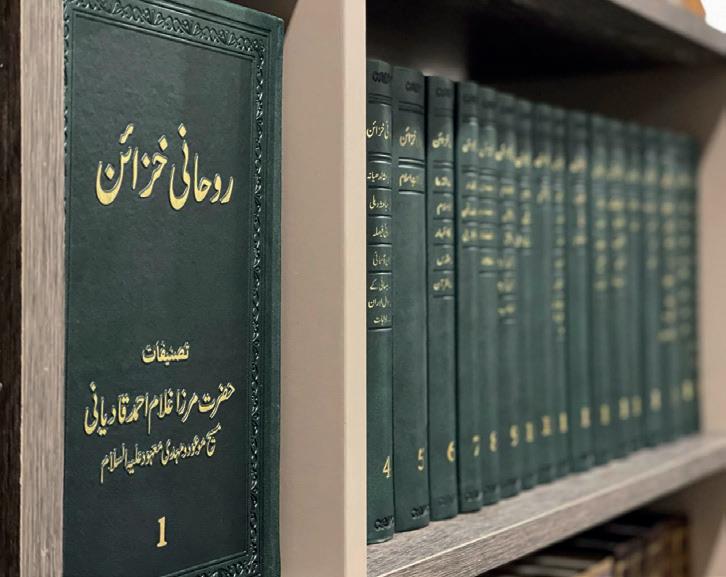
Messiahas left behind, i.e., the Qudrate-Thania – means that the Ahmadiyya theology will never die. There will always remain a system, namely Khilafat, to provide guidance in any given circumstance.
This alone makes the Ahmadiyya theology different from any other sect whose leaders died, and so did their reform. The Ahmadi Muslims are the only ones who have had, and will have, divinely guided instructions right to the end of the world. Insha-Allah
Friday 25 August 2023 | AL HAKAM 2
Photo courtesy of Suhaib Ahmad
An old view of Qadian | Image: Library
Navigating the euthanasia debate through Islamic teachings


Luqman Ahmed Missionary Ottawa, Canada
Euthanasia refers to the deliberate act of hastening an individual’s death to relieve them of incurable pain or poor quality of life. Notably, in recent years, euthanasia has gained increasing acceptance and adoption in a number of Western countries.
The religion of Islam unequivocally conveys its stance regarding euthanasia. It prohibits the termination of any person’s life, even under the pretence of mercy or pain alleviation. This is explained in the Holy Quran, where Allah declares: “And kill not yourselves. Surely, Allah is Merciful to you.” (Surah an-Nisa, Ch.4: V.30) Additionally, the Holy Quran emphasises the sanctity of life by asserting: “And kill not the soul which Allah has forbidden save for just cause.” (Surah Bani Isra’il, Ch. 17: V.34)
The Holy Prophet Muhammadsa once stated:
“Among the nations before you, there was a man who, after receiving a wound, grew impatient (with its pain). He took a knife and cut his hand with it, and the blood did not stop until he died. Allah said, ‘My Slave hastened his own death, so I have
forbidden him from entering Paradise.’” (Sahih al-Bukhari, Ahadith al-anbiya, Hadith 3463)
In contrast, Islam imparts the virtue of patience when confronted with affliction or illness. Allah says: “And We will try you with something of fear and hunger, and loss of wealth and lives, and fruits; but give glad tidings to the patient,” (Surah al Baqarah, Ch.2: V.156). The Holy Prophetsa further instilled the value of patience among his followers, affirming that enduring pain and hardship leads to divine rewards. He once stated: “No calamity befalls a Muslim except that Allah expiates some of his sins because of it, even if it is just the prick he receives from a thorn.” (Sahih al-Bukhari, Kitab al-marda, Hadith 5640)
Hence, we find ourselves at a crossroads. On one side, there are advocates of euthanasia who aim to alleviate an individual’s pain and suffering by facilitating a peaceful end to their life. Conversely, the teachings of Islam and other faiths underscore the sanctity of human life, asserting that no entity should possess the authority to terminate another human life, even under the guise of compassion.
This dichotomy raises an interesting question: Why is it preferable to embrace patience and withstand profound agony and hardship, as opposed to resorting to euthanasia?
Pondering over the concept of euthanasia, it becomes clear that its drawbacks outweigh the benefits. As a society, our focus should be on finding alternative ways to alleviate pain, provide comfort, and reduce suffering for patients, rather than choosing to end their lives.
As Muslims, we hold the fundamental belief that Allah Almighty is our Lord and possesses the power to heal. Therefore, one must never give up on the mercy of Allah, “‘for none despairs of Allah’s mercy save the unbelieving people.’” (Surah Yusuf, Ch.12: V.88) Hence, we must evaluate, reflecting on societal values and human dignity, the challenges posed by euthanasia.
1. Hopelessness: A key principle of an advancing society is rooted in hope and the ability to navigate challenges. This vital attitude is ingrained even in our roles as parents, as we impart to our children the importance of perseverance and the refusal to surrender when confronted with adversity. We encourage them to persist and strive until they uncover solutions. This rigid determination to conquer any obstacle, no matter how formidable, is a pivotal driver of progress.
As I see it, the rise of euthanasia within our societal fabric promotes a sense of despondency. It conveys the message of embracing one’s circumstances instead of actively pursuing avenues for enhancement. Our society already grapples with the issue of suicide, often driven by a perceived absence of hope or avenues for betterment. Embracing such attitudes is likely to worsen these issues further.
2. Parental relationship: Secondly, the profound bond between parents and their children is a universal sentiment of human beings. As parents age, their children dedicate themselves to ensuring their parents’ well-being and comfort. This mutual care and devotion are highly esteemed values within our society. It has long been established as a societal standard that parents nurture their children with care, and children selflessly care for their ageing parents.
In my perspective, the normalisation of euthanasia erodes this cherished norm of responsibility towards elderly parents, introducing an entirely different approach to providing solace. As the acceptance of euthanasia expands, it is concerning, even unconsciously, that parents might increasingly perceive themselves as burdens on their children, thus altering the dynamics of this wonderful bond.
3. Sanctity of human life: Thirdly, euthanasia stands as a stark departure from the core principle that underscores the sacredness and sanctity of every human life. This principle, deeply rooted in ethical, religious, and societal foundations,
asserts the inherent worth of each human existence. When we condone the act of one human being ending the life of another, even in the name of mercy, we risk diluting the sanctity that has long been revered. It introduces the notion that the worth of life can be conditional upon situational assessments.
Thus, the acceptance of euthanasia undermines the intrinsic belief that all lives are inherently valuable and deserving of protection. This erosion has the potential to dampen our ability to advocate for the welfare of fellow humans, to extend compassion and assistance to the ailing, and to uphold the sanctity of life in all its forms.
Hence, we should seek alternative avenues rather than intentionally terminating lives as a means to alleviate suffering. While the well-intentioned motives of proponents advocating for compassionate euthanasia can be acknowledged, this trajectory will steer our society towards a potentially harmful course in the years and decades ahead.
The Holy Prophet Muhammadsa once stated, “None of you should wish for death because of a calamity that befalls them; but if one has no alternative, let them pray:
‘O
Keep me alive as long as life is better for me, and let me die if death is better for me.’” (Sahih al-Bukhari
3 AL HAKAM | Friday 25 August 2023
تناك اذإ ينفوتو ،ي اريخ ةايحلا تناك ام ينيحأ مهللا يل اريخ ةافولا
Allah!
, Kitab alMardha, Hadith 5671)
Mulyadi | Unsplash
Marcelo Leal | Unsplash
This Week in History
A glimpse into the rich history of the Ahmadiyya Muslim Jamaat
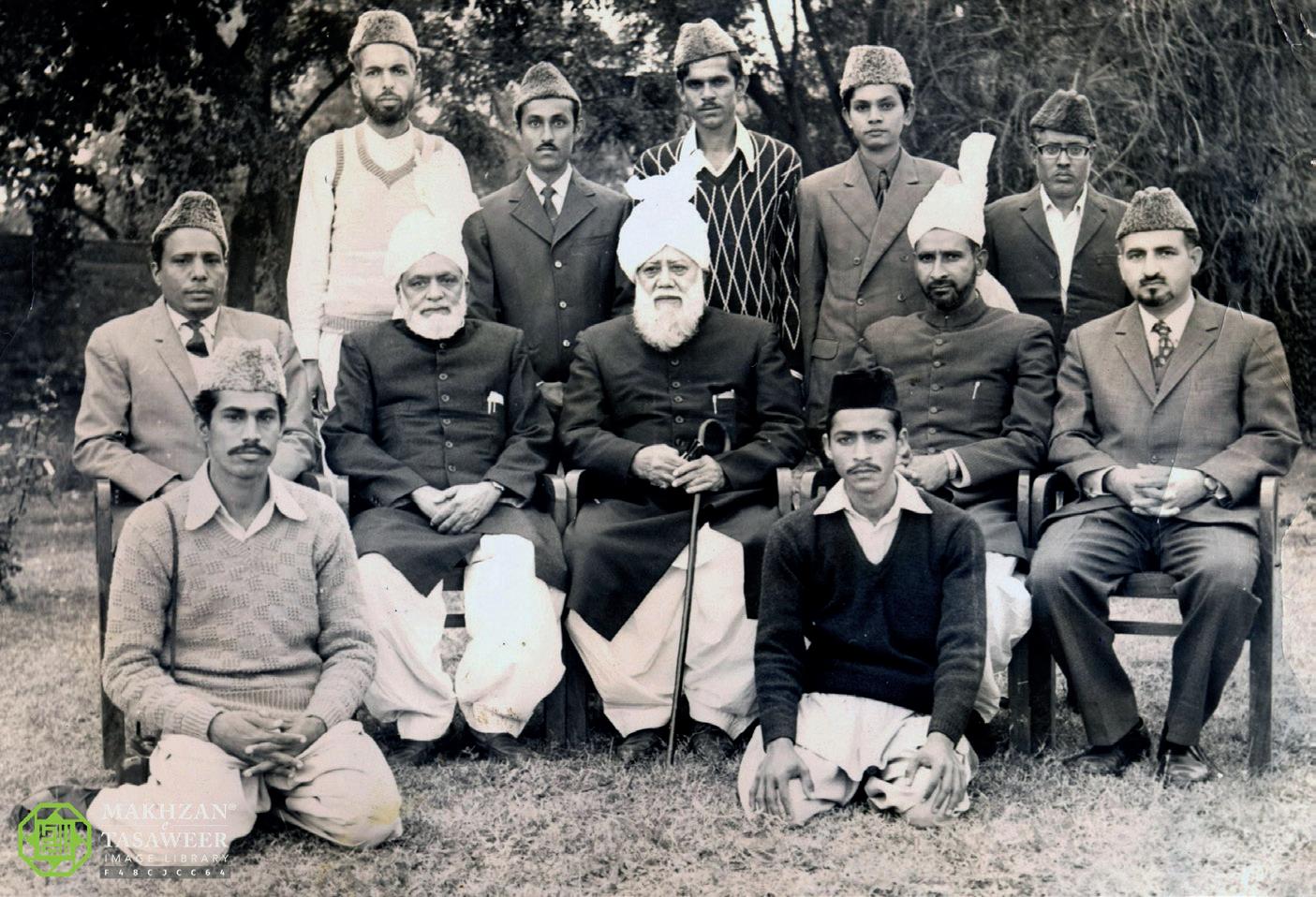
25 August
25 August 1899: On this day, the Promised Messiahas wrote a letter to Hazrat Haji Seith Allah Rakha Abdur Rahmanra addressing various matters like his proposed visit to Qadian, drastic changes in climate pattern, which was causing fears and concerns for farmers in Punjab and the growing number of plague cases in Calcutta. In this letter, Hazrat Ahmadas shared an interesting story that was creating hype in newspapers during those days, that planet Earth would see its final destruction on 13 November 1899, as a gigantic meteor was approaching to hit the earth. Moreover, Huzooras mentioned that a newspaper

26 August
26 August 1921: On this day, Hazrat Musleh-eMaudra addressed the local Jalsa of Jamaat Asnoor in Kashmir.
The total attendance was around 500. Huzoor’sra lecture lasted for four and a half hours. (Tarikh-e-Ahmadiyyat, Vol. 4, p. 284)
26 August 1988: On this day, Hazrat Khalifatul Masih IVrh began his tour to East Africa, which was the first ever visit to East Africa by any Khalifatul Masih. (Silsila Ahmadiyya, Part 4, p. 849)
27 - 28August
27 August 1973: On this day, during his tour of Europe, Hazrat Khalifatul Masih IIIrh left for Italy at 10am. Huzoorrh , along with his entourage, entered Italy’s border at 7pm after a long journey. Huzoor’srh stay was arranged in Hotel Gabrielli Sandwirth, Venice. (Tarikh-e-Ahmadiyyat, Vol. 29, pp. 195-196)
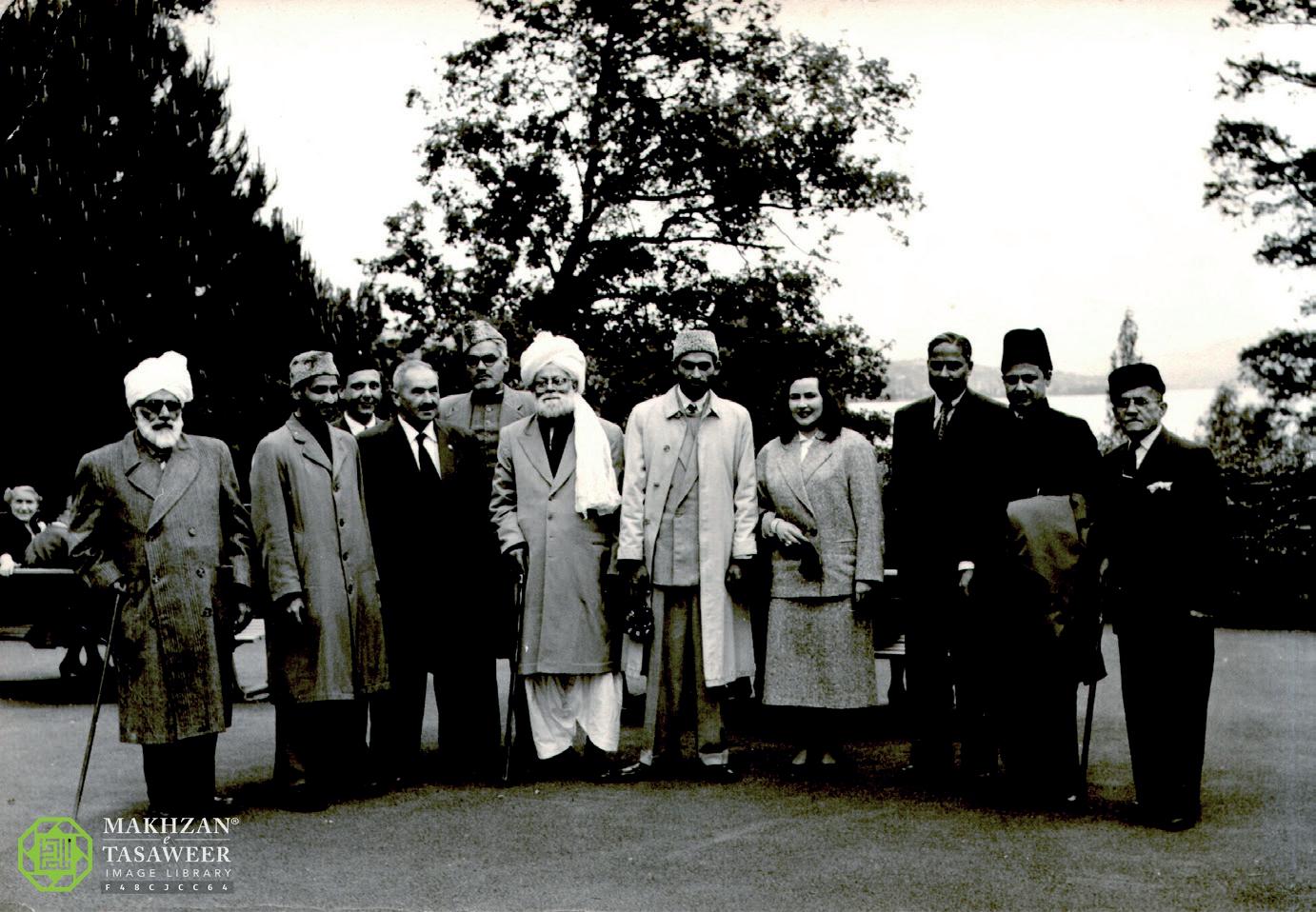
28 August 2016: On this day, Hazrat Khalifatul Masih Vaa laid the foundation stone for the first Ahmadiyya mosque in Pfungstadt, in the state of Hesse, Germany.
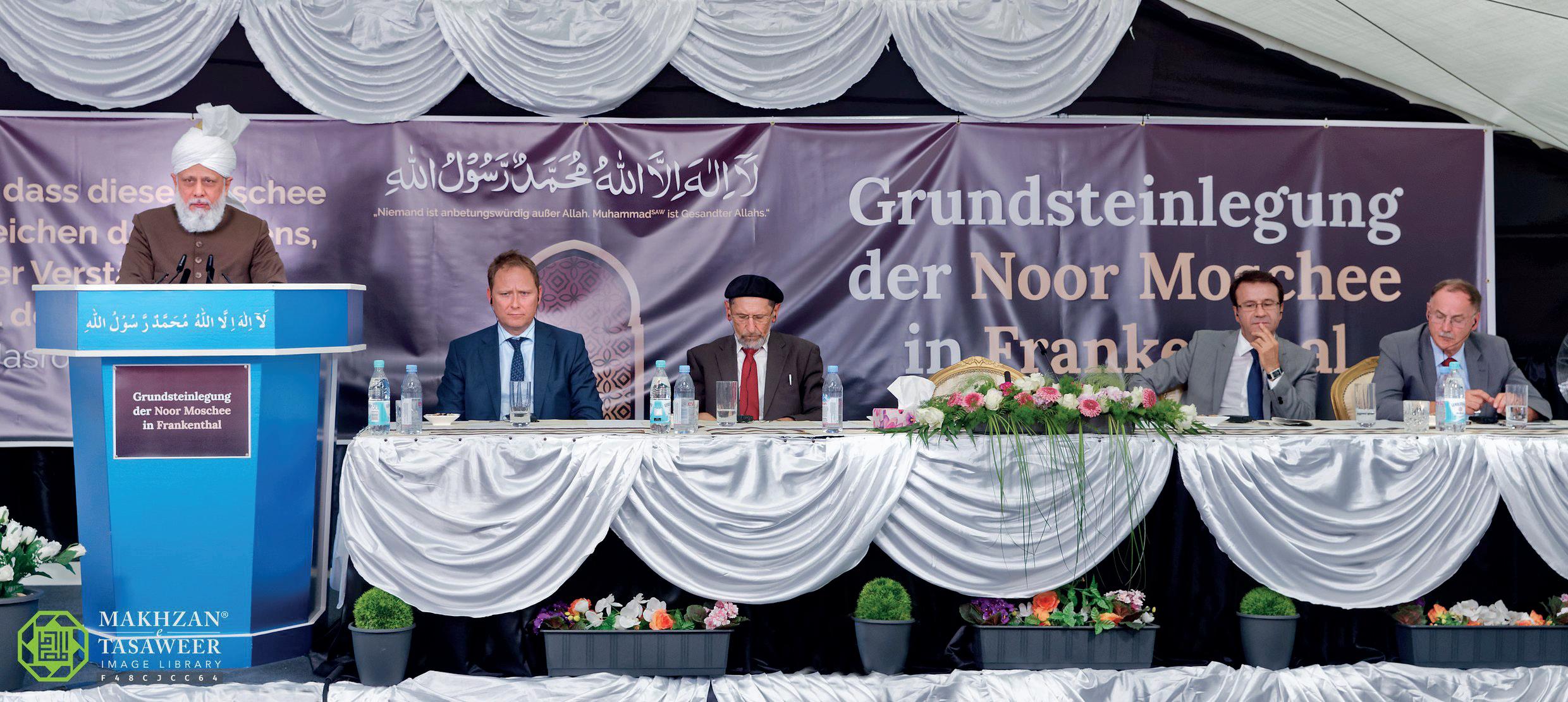
29 August
29 August 1988: On this day, Hazrat Khalifatul Masih IVrh
addressed a reception that was held in his honour at the InterContinental Hotel in Nairobi, Kenya. On the same occasion, the Kikuyu translation of the Holy Quran was also unveiled. (Silsila Ahmadiyya, Part 4, p. 849)
29 August 2008: During his Friday Sermon on this day, Hazrat Khalifatul Masih Vaa mentioned that in recent days, Ahmadi homes were attacked in Saharanpur, UP, India, where Ahmadis were beaten up and injured, their belongings were damaged, and even an attempt was made to put their homes on fire. Huzooraa added that the Ahmadis who were attacked were all new converts, however, they had firm faith in
has written that the Viceroy of India has received a vaccination against the ongoing plague. (Maktubat-e-Ahmad, Vol. 2, p. 394)
25 August 1946: In 1946, Hazrat Musleh-e-Maudra saw a vision in which he was foretold by Allah the Almighty that a delicate time was coming for Islam and Muslims needed to unite to tackle that issue. On this day, Huzoorra wrote an article titled Al-Inzaar (The Warning), wherein he mentioned his vision in detail and advised the Muslims in this regard. For more details, see Al Hakam’s articles in its 21 May 2021 issue.
Friday 25 August 2023 | AL HAKAM 4
Office staff of Nusrat Jehan Scheme with Hazrat Khalifatul Masih IIIrh , Rabwah, 1970
Hazrat Musleh-e-Maudra in Zurich, Switzerland
Hazrat Khalifatul Masih Vaa addressing guests at the foundation of Noor Mosque, Frankenthal, Germany.
Ahmadiyyat.
Huzooraa said that although those Ahmadis were brought to Qadian and the injured ones were being treated in hospitals, they had to endure huge losses to their homes and belongings.
Huzooraa said that these acts were done in the name of Islam by socalled Muslims, and Ahmadis were also being persecuted in some other Muslim-majority areas of India.

Huzooraa further said that a new wave of persecution had started in Pakistan as well; the police had removed the kalima from a Jamaat’s centre in Lahore, and stones were thrown at a mosque in Kunri and at Ahmadi homes as well.

30 - 31 August

30 August 1953: On this day, Hazrat Musleh-e-Maudra addressed a reception at the Beach Luxury Hotel in Karachi, Pakistan, organised in his honour by Jamaat-e-Ahmadiyya Karachi. The topic of Huzoor’sra address was “Haqiqi Islam” – True Islam.
For more details, see “Why previous prophets were called ‘Muslims’ in the Holy Quran: Hazrat Muslehe-Maud’s address at a reception in Karachi, 1953” (Al Hakam, 25 November 2022, Issue 245, p. 15).

30 August 1970: On this day, while addressing Ahmadi doctors, Hazrat Khalifatul Masih IIIrh narrated the details of the Nusrat Jehan Leap Forward Scheme, and encouraged them to offer their services in Africa under this scheme.
For more details, see “Nusrat Jehan Scheme: Khilafat’s impetus for ‘Africa to Leap Forward’ – A glimpse into the early years (1970-1982)”, Al Hakam, 27 May 2022, Issue 219, p. 17.)


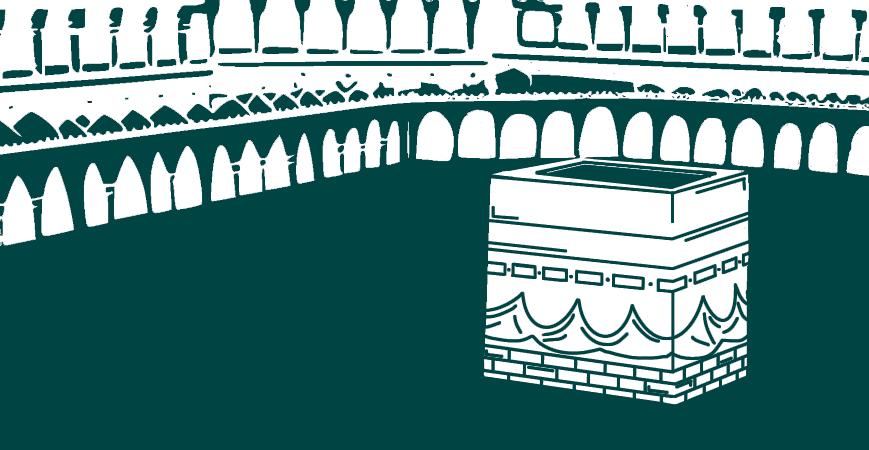
30 August 2016: On this day, Hazrat Khalifatul Masih Vaa laid the foundation stone of the Noor Mosque, the first Ahmadiyya mosque in Frankenthal, Germany.
31 August 1955: On this day, Hazrat Musleh-e-Maudra delivered a lecture in Zurich, Switzerland about the spirit of religion and its basic principles. According to volume 16 of Tarikh-e-Ahmadiyyat, this lecture was given in English.
7th annual ijtema held by Lajna Imaillah Finland
 Rehana Kokab
Sadr Lajna Imaillah Finland
Rehana Kokab
Sadr Lajna Imaillah Finland
Lajna Imaillah Finland held its 7th annual ijtema on 5 and 6 August 2023.
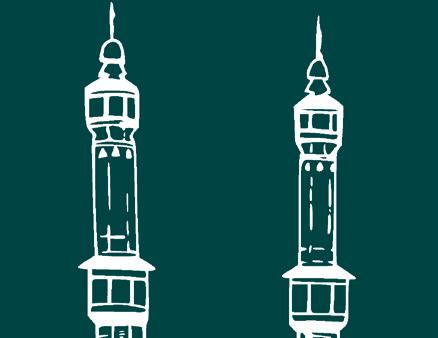
The ijtema commenced on the morning of 5 August with the recitation from the Holy Quran, followed by the Lajna pledge, poem, and opening remarks by my humble self. After this, academic competitions were
held.
During the ijtema, special focus was maintained on video clips from various virtual mulaqats where Hazrat Khalifatul Masih Vaa had answered questions on an array of topics. These clips were shown after each competition to provide spiritual guidance to Lajna. Participants listened to the guidance very attentively, and this initiative was very appreciated.
During the concluding session, after
tilawat and nazm, a presentation was delivered about the history of Lajna Imaillah Finland by General Secretary Tahira Nasir Sahiba, and Naib General Secretary Munazza Zafar Sahiba.
On the occasion of the annual ijtema, the first annual magazine of Lajna Imaillah Finland was introduced, entitled Mubaraka A heartfelt message filled with guidance and affection was sent by beloved Huzooraa for this magazine, which has been included in its first issue. This message was read out by my humble self. All Lajna and Nasirat expressed great joy and happiness and thanked Allah for this blessing. Copies of this magazine were given to the presidents of all majalis so that all members could benefit from it.
At the end, the results of the competitions were announced and prizes were distributed to the members who secured positions. Furthermore, certificates were awarded to those Lajna who completed the targets of the centenary jubilee celebration of Lajna Imaillah.
The ijtema was attended by 98 members and four guests as well.


5 AL HAKAM | Friday 25 August 2023 25 - 31 August
Prophets of Allah ﻰﻓ ﺎﻨﺜﻌﺑ ﺪﻘﻟﻭ ﻻﻮﺳﺭ ﺔﻣﺃ ﻞﻛ Read detailed reaserch on each and every prophet mentioned in the Holy Quran! Available only at www.Alhakam.org
Names of Allah
91-104

‘Call on Him by these’
Rizwan Khan Missionary, USA
91. Yā Mubdi’ - O Beginner!ئدبم
92. Yā Mu‘īd - O Restorer! - ديعم اي
Meaning
Together, al-Mubdi’ and al-Mu‘īd mean He who created mankind, and who returned them to death after life and, after death, to life on the day of resurrection.
The root meaning of mubdi’ is to begin, originate, or bring into existence. Al-Mubdi’ means the Creator who produced things at the beginning. (Lane’s Lexicon, Root: أدب Entry:
)
al-Mubdi’, al-Mu‘īd, al-Fātir, al-Badī‘, al-Khāliq, al-Khallāq, al-Bāri’, al-Musawwir, al-Muhyī, al-Mumīt, al-Bā‘ith, al-Qābid, al-Bāsit, al-Wāsi‘
The root of mu‘īd means returning or restoring something to a former state, and renewing or reproducing it. (Lane’s Lexicon, Root: دوع Entry: دوعا) In application to this world, al-Mu‘īd (The Restorer) refers to how Allah Almighty causes one generation to replace the other. In application to the hereafter, al-Mu‘īd (The Restorer) refers to the new life that Allah Almighty gives us after death. (The Holy Quran with English Translation and Commentary, 10:5, p. 1219)
Similar names
This name is also mentioned under al-Fātir (The Creator/Originator) and al-Badī‘ (The Originator).
Use in prayer
In almost every instance where the root of al-Mubdi’ (The Beginner) is used in the Holy Quran, it is accompanied by the root of al-Mu‘īd (The Restorer). We are thus reminded that the same God Who created from nothing can easily restore creation, even after it is destroyed to almost nothing. When we pray, the name al-Mu‘īd (The Restorer) reminds us how Allah Almighty has restored humanity after repeated destruction, and He has renewed His Divine communities despite countless trials and setbacks. Allah Almighty says, “He it is Who originates (أدبي) the creation, then keeps repeating (ديعي) it, and it is most easy for Him.” (Surah ar-Rūm, 30:28) When we say Yā Mubdi’ (O Beginner!) and Yā Mu‘īd (O Restorer!), we pray knowing that no matter what loss we suffer, it is easy for Allah Almighty, Who created us from nothing, to restore and renew us from nothing.
93. Yā Fātir - O Creator/ Originator! - ر�اف اي
Meaning
The root of fātir means to split. It is used to refer to a tooth splitting the flesh and coming out, which indicates the connection this root has with ‘bringing into existence’. Fātir also means the One Who extracts something by breaking the shell. Al-Fātir means the One who brings into existence for the first time. (Lane’s Lexicon, Root: ��ف Entry: ر�اف ،��ف; The Holy Quran with English Translation and Commentary, p. cccxxxi)
Similar names
The Holy Quran refers to: 1) The stage when nothing existed and the process of creation began for the first time; 2) and the stage when matter had come into existence but had not yet taken a definite material form. The name Fātir refers to the second stage of creation. (Tafsir-e-Kabir, Vol. 3, p. 451)
The difference between al-Mubdi’ and al-Fātir is that the root of Mubdi’ refers to
the general concept of a very beginning and start, whereas the root of Fātir refers to the specific point where creation physically started for the first time.
Use in prayer
When we bring to mind al-Fātir (The Creator/ Originator), the thought of something being created from nothing should cause us some disorientation. Our mind can comprehend creating from something, but creating from nothing is beyond our experience. It doesn’t seem possible, but we cannot dismiss it because we know there must be a cause of all causes. When we say Yā Fātir (O Creator/ Originator), we bring to mind how the power of Allah Almighty is incomprehensible. This reminds us that Allah Almighty has the power to accept our prayers.
The Promised Messiahas said, “Your God is One Who has suspended numberless stars without any support and Who has created heaven and earth from nothing. Then would you think so ill of Him as to imagine that your objective is beyond His power?”
(Essence of Islam, Vol. 2, p. 213)
Sometimes when we pray, we can think that maybe we are asking too much of Allah and that accepting our prayer would somehow be difficult for Him. When we say Yā Fātir (O Creator/Originator), we are reminded that if Allah Almighty created everything we see from nothing, then creating the means for the acceptance of our prayer is easy for Him.
94. Yā Badī‘ - O Originator! - عيدب اي Meaning
When used about a person, the word badī‘ refers to an inventor or innovator. When applied to Allah Almighty, it refers to originating a thing without any tool, instrument, or pattern and without matter. Al-Badī‘ means The Originator who creates without the similitude of anything preexisting. (Lane’s Lexicon, Root: عدب Entry: عيدب; The Holy Quran with English Translation and Commentary, 2:118, p. 213)
Similar names
When al-Mubdi’ (The Beginner) and alBadī‘ (The Originator) are contrasted, the emphasis in al-Mubdi’ is on creating from non-existence, whereas the emphasis in alBadī‘ is on creating in an original way that there is no example of previously. (Bihar al‘Anwar, Muhammad Baqir Majlisi, Section 87, Chapter 72, See
Al-Mubdi’ (The Beginner) refers to the start of the creation of this world, not the stages after. Al-Mu‘īd (The Restorer) refers
to the renewal of life in this world and the restoration of life in the hereafter, but it does not refer to the start of this world. However, al-Badī‘ (The Originator) can refer to all these stages. It can refer to any stage of creation that is so novel that it is without precedent, whether in this world or the hereafter. (Al-Futuhat al-Makkiyya, Ibn Arabi, al-Bab 198, al-Fasl 38)
Use in prayer
When we pray, we sometimes think of the possible ways we think Allah Almighty could give us what we are asking for. If we cannot think of a possibility, or the possibilities we think of seem improbable, we can lose motivation to offer that prayer. The name alBadī‘ (The Originator) reminds us that the creative powers of Allah Almighty are not confined to our estimates of His options. Rather, He can create in infinitely new ways and accept our prayers in ways we never knew of. When we say Yā Badī‘ (O Originator!), we pray knowing that even if what we want to happen seems improbable to us, Allah Almighty can create ways for it to happen that we never considered and were unknown to us before.
95. Yā Khāliq - O Creator! - قلاخ اي
96. Yā Khallāq - O Supreme Creator! - ق��خ اي
Meaning
The root of khāliq means to measure or to make something according to a measure. When used about a person, khāliq refers to a leather worker because he makes something after measuring. When used about Allah Almighty, al-Khāliq means the One who brings into existence according to a proper measure. The emphasis in al-Khāliq is on Allah Almighty creating according to a predetermined plan. (Lane’s Lexicon, Root: قلخ Entry: قِلاخ ،قلخ; Kashf al-Ma’na ‘an Sirr Asma Allah al-Husna, Ibn Arabi, (12) alIsm: al-Khāliq)
Al-Khāliq (The Creator) and al-Khallāq (The Supreme Creator) come from the same root. These two words are synonymous, but khallāq is in the intensive fa’’āl (لاعف) form. This form describes the repetition and frequency of the action in the root meaning. In both instances where the name al-Khallāq (The Supreme Creator) is used in the Holy Quran, it specifically describes how Allah Almighty creates again and again.
The name al-Khallāq (The Supreme Creator) emphasises that Allah Almighty never hesitates to destroy the wicked because He can easily bring into existence a better people. (Tafsir-e-Kabir, Vol. 4, p. 109)

Friday 25 August 2023 | AL HAKAM 6
اي
ئدبملا ،أدب
امل دجوملا ئدبملا يا ئدبلا : ﺢيﺿوت لاﺜم ىلع �ل قﺋ��ﺨلا قلاخ عدبملا يأ عيدبلا ،مدعلا متﻛ نم هاوس قباس”)
“
Ebru Yılmaz | Unsplash
Similar names
The name al-Khāliq (The Creator) is the broadest of all the names related to creation, and it can cover all of the stages other names describe. For example, it means He who creates from non-existence in a way that has no precedent. It also means to create from something. (Friday Sermon, 7 May 2010, Khutbat-e-Masroor, Vol. 98, pp. 214-215; Lane’s Lexicon, Root: قلخ Entry: قِلاخ)
This name is also mentioned under al-Bāri’ (The Maker), al-Musawwir (The Fashioner), and al-Wāhid (The One).
Use in prayer
The Holy Quran uses this root more than any other in describing the different aspects of creating. Thus, we use this name in prayer more broadly than any other name related to creating.
For example, if someone does not have children, he can pray, “Yā Khāliq (O Creator!), grant me a child.” (Tafsir-e-Kabir, Vol. 9, p. 269)
97. Yā Bāri’ - O Maker! - ئراب اي
Meaning
The root of bāri’ means to be free of fault. It also means to create. Al-Bāri’ (The Maker) is He who has created things free from any faultiness. (Lane’s Lexicon, Root: أرب Entry: ئراب ،أرب)
Similar names
Al-Khāliq (The Creator) applies to the creation of everything, whereas al-Bāri’ (The Maker) usually only applies to the creation of living creatures, or to the creation of souls. (Tafsir Hazrat Masih-e-Maudas, 59:25, Vol. 7, p. 389; Lane’s Lexicon, Root: برأ Entry: برأ)
This name is also mentioned under alMusawwir (The Fashioner).
Use in prayer
When the Children of Israel began worshipping an idol, Allah Almighty reprimanded them by means of this name and said, “turn to your Maker (Bāri’).” (Surah al-Baqarah 2:55) This meant that they worshipped defective things they had made, but they should have instead worshipped al-Bāri’, which means the One who made them without any defect. (Tafsire-Kabir, Vol. 1, p. 453)
When we pray, the name al-Bāri’ (The Maker) reminds us that we have been created perfectly for a spiritual purpose. When we say Yā Bāri’ (O Maker!), we pray that Allah Almighty helps us achieve the higher purpose for which He created us.
98. Yā Musawwir - O Fashioner! -
روصم اي
Meaning
The root of musawwir means to form, fashion, or sculpt. When used about a person, musawwir refers to a sculptor or painter. When used about Allah Almighty, al-Musawwir means The Former or The Fashioner. (Lane’s Lexicon, Root: روص Entry:
)
is that of 1. an architect, 2. a builder, and 3. a decorator. (The Ninety-Nine Beautiful Names of God, al-Ghazali, p. 68)

Al-Khāliq (The Creator) refers to the intent to create, al-Bāri’ (The Maker) refers to manifesting the power of creation and making a body, and al-Musawwir (The Fashioner) refers to forming the attributes of the body. (Friday Sermon, 14 February 2003)
When only the names al-Khāliq (The Creator) and al-Musawwir (The Fashioner) are contrasted, they are interrelated like body and soul. Al-Khāliq (The Creator) refers to creating a thing and giving it a general physical form, and al-Musawwir (The Fashioner) refers to detailed formation and giving a child moral and spiritual
Meaning
The root of muhyī means life, and the root of mumīt means death.
Similar names
Al-Muhyī (The Giver of Life) and al-Mumīt (The Causer of Death) are opposites. This name is also mentioned under alBā‘ith (The Raiser of The Dead), al-Qābid (The Withholder), al-Bāsit (The Expander), and al-Hayy (The Living).
Use in prayer
Allah Almighty has created a system where life and death are inseparably interrelated. When a person dies, his body becomes a source of life for plants. Those plants are eaten, and their deaths are a source of life for the animals that need to consume them.
sometimes say, ‘Yā Muhyī (O Giver of Life!),’ and pray they are given life. However, we cannot forget the potential blessings in alMumīt (The Causer of Death) in certain circumstances, e.g., in situations where a loved one is suffering from a terminal illness and life would only prolong their suffering. This same principle applies if we say, ‘Yā Mumīt (O Causer of Death!),’ and pray for the death of an enemy, because we don’t know if that enemy will change and be a source of great good.
These two names also develop trust in Allah Almighty. For example, if we see that death is imminent and it seems there is no way to escape destruction, people ordinarily despair. However, a believer never despairs. He remembers that Allah Almighty is Muhyī (Giver of Life) and anything is possible for Him. On the other hand, when everything is going according to plan and we have no other reason to consider our destruction, a believer does not become arrogant. He remembers that Allah Almighty is also Mumīt (Causer of Death), so he never relies on only himself. (Tafsir-e-Kabir, Vol. 6, p. 543)
When we say Yā Muhyī (O Giver of Life!) and Yā Mumīt (O Causer of Death!), we bring to mind how fragile life is, and we pray with a renewed sense of humility and reliance on Allah Almighty.
101. Yā Bā‘ith - O Raiser of The Dead! - ثعاب اي
Meaning
When the root of bā‘ith is used for Allah Almighty, it means creating from nothing, bringing the dead to life, or sending a prophet. Al-Bā‘ith means the One who will bring mankind to life after death. (AlMufradat, ar-Raghib, Root: ثعب; Lane’s Lexicon, Root: ثعب Entry: ثعب; Lisan al-‘Arab, Ibn Manzur, Root: ثعب)
Similar names
Al-Muhyī (The Giver of Life) and al-Bā‘ith (The Raiser of The Dead) are synonymous in their meaning of giving life, but al-Bā‘ith is used more specifically for life after death.
Use in prayer
Similar names
When the names 1. al-Khāliq (The Creator), 2. al-Bāri’ (The Maker), and 3. al-Musawwir (The Fashioner) are contrasted, each name has a unique emphasis. For example, when a house is built, it requires 1. planning, 2. building, and 3. designing. An analogy for the difference between these three names
faculties. (The Holy Quran with English Translation and Commentary, Surah Al-e‘Imran, 3:7, p. 452)
Use in prayer
When we pray, the name al-Musawwir (The Fashioner) brings to mind the creative power of Allah Almighty in the last stages of creation. If someone is expecting a child, they say Yā Musawwir (O Fashioner!) and pray that Allah Almighty gives them a child with beautiful physical features and spiritual capacities.
99. Yā Muhyī - O Giver of Life!ىيحم اي
100. Yā Mumīt - O Causer of Death! - تيمم اي
We eat those animals, and their deaths are a source of life for us. Every life brings news of death, and every death brings news of life. (Tafsir-e-Kabir, vol. 6, p. 86)
The name al-Muhyī (The Giver of Life) is not positive in and of itself, and the name al-Mumīt (The Causer of Death) is not negative in and of itself. When we pray, we should pray for the blessings in these two names.
The Holy Prophetsa said, “Let not one of you wish for death because of a misfortune that befalls him. If he cannot help doing so, he should say: ‘O Allah, keep me alive as long as You know that life is better for me, and make me die when death is better for me.’” (Sahih al-Bukhari, Kitab ad-da‘wat, Bab ad-du‘a’i bi l-mawti wa l-hayah)
When someone we love is ill, we
Denial of the Resurrection, whether by word or conduct, is at the root of all sin. This is why, after belief in the existence of God, the Holy Quran places the greatest emphasis on life after death. (The Holy Quran with English Translation and Commentary, Surah al-Waqi’ah 56:48, p. 3079) It is belief in the Resurrection that develops in us a love and fear of God. (Tafsir-e-Kabir, Vol. 6, p. 171) The name al-Bā‘ith (The Raiser of The Dead) brings to mind that moment when we will leave this world behind forever and then begin a different life. It creates an anticipation of meeting Allah Almighty and an apprehension of facing accountability. When we say Yā Bā‘ith (O Raiser of The Dead!), we feel fear of the unknown after death, and we pray that Allah Almighty raises us with the righteous.
102. Yā Qābid - O Withholder!ضباق
103. Yā Bāsit - O Expander! - طساب اي Meaning
7 AL HAKAM | Friday 25 August 2023 Continued on page 10 >>
روصم ،روص
اي
Hasan Almasi | Unsplash
New scramble for Africa: Defending Africa’s emancipation
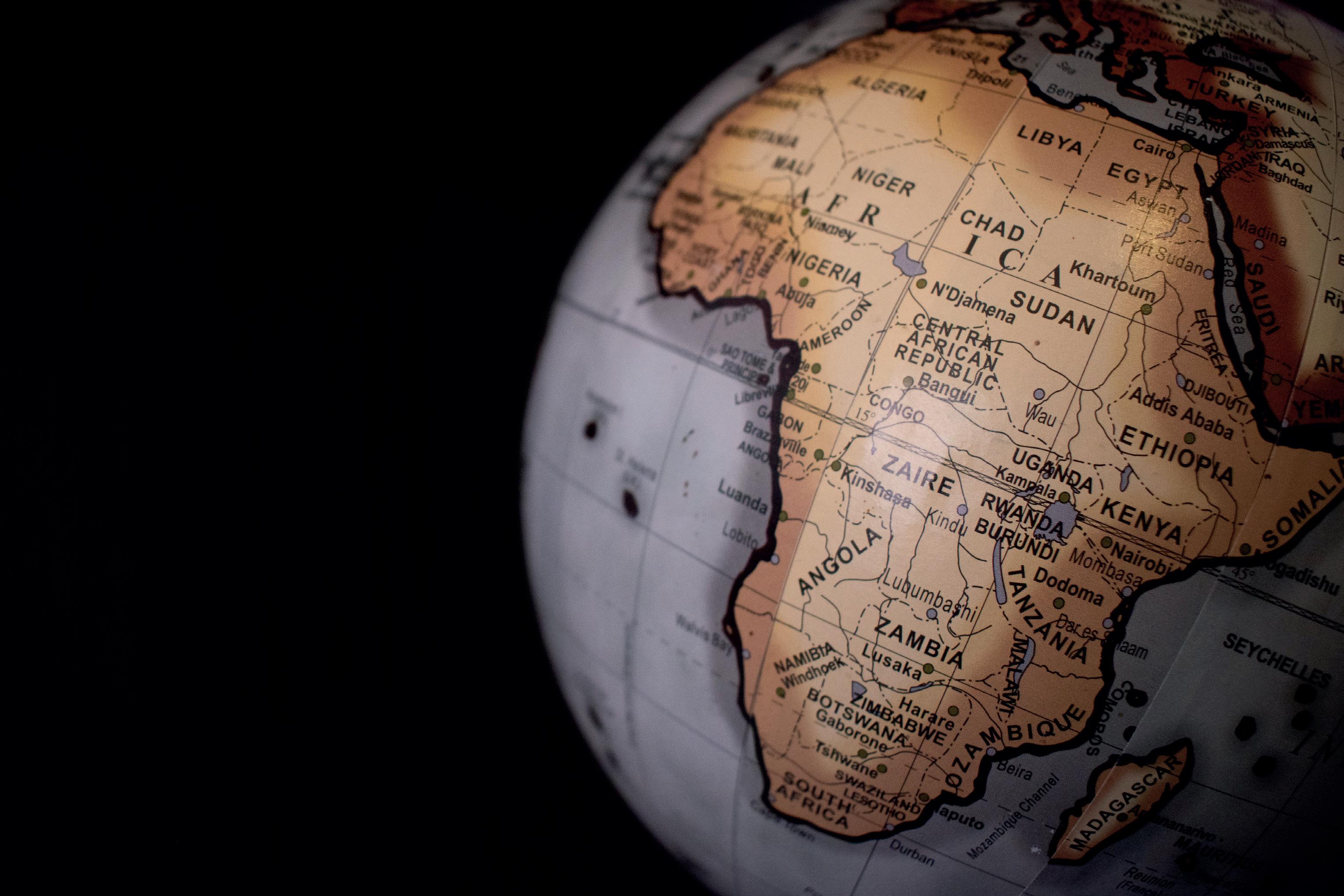
Ali Fatty Jamia Ahmadiyya International Ghana
On 25 May 2023, African Liberation Day was celebrated across the continent, an annual celebration of African sovereign rule, independence, and African identity. This year marks the 60th anniversary of the Organisation of African Unity (OAU), now the African Union (AU). This 60th anniversary is being celebrated under the slogan: “Our Africa Our Future” using the hashtag #OurAfricaOurFuture. (https:// au.int/en/announcements/20230509/ commemoration-africa-day-may-25-2023)
However, today many youths, intellectuals, Pan Africans, and even some seasoned politicians express that the status quo of Africa’s independence, sovereignty, and total liberation is alarming in connection to the continent’s relationship with foreign powers around the world. (www.youtube. com/watch?v=76hLdREQ-bE)
Recently, we have seen belligerent vying by foreign leaders to meet their African counterparts, reflecting a growing awareness that they need to deepen their engagement with the continent or gain the upper hand in the continent’s political landscape against rival countries.
The continent also faces myriad internal issues affecting all opportunities for meaningful development. Many countries on the continent have been engulfed in endless and brutal wars for decades, resulting in the deaths of millions of innocent citizens.
In this article, we will observe the details that underscore the new scramble for Africa, the history of Africa’s bilateral ties with foreign states, what the future holds for Africa, and the ways forward for the continent in light of the invaluable guidance the worldwide head of the Ahmadiyya Muslim Community bestowed on the leaders of the continent in different meetings. To begin with, let us look at the current state of affairs of the continent.
Africa in the world today
According to reports, the rising youth generation in Africa is a global powerhouse for investment, with one report stating: “The median age in the continent is only 19 years old, and roughly half of the world’s population growth is going to happen in Africa over the next several decades, which is just an enormous potential for the region.” ( www.africanews.com/2023/03/25/us-vicepesident-kamala-harris-visits-africa/)
The motives for the new race for Africa by foreign countries can be divided into two main factors: securing political backing from the African leaders in global multilateral institutions and accessing the rich mineral resources of the continent for Western industries.
Africa has 9.6% of the global oil output, 90% of the world’s platinum supply, 90% of the world’s cobalt supply, 50% of the world’s gold supply, two-thirds of the world’s manganese, 35% of the world’s uranium, and 75% of the world’s coltan. (www.youtube. com/watch?app=desktop&v=zrjHY-lD2kU)
The eagerness of foreign authorities to engage with the continent has raised fears and concerns among intellectuals, Pan Africans, and citizens that Africa is facing a new form of colonial annexation that is no less devastating in scale and impact than that which the continent suffered in the 19th century.
Many African youths have also raised similar concerns that the new scramble for Africa by foreign powers is not in the best interest of the continent and that the leaders of the continent might be repeating the mistakes of the past in shackling the continent to foreign countries in the form of colonisation in the 21st century.
However, of late, the relationship between former colonial masters and their former colonies has soured, leading to the expulsion and banishment of foreign militia by some leaders of these countries, as is the case in Burkina Faso and Mali. (https:// abcnews.go.com/International/wireStory/ after-burkina-faso-ousts-french-russiaswagner-arrive-98424640)
Foreign relations in Africa
While the relationship between some previous imperial masters and their former colonies have worsened, other rival countries have taken advantage of the opportunity to increase their involvement in strengthening ties with the leaders of such countries.
The undeniable fact remains that Africa is becoming a diplomatic battleground, like the events of the 18th century, when large portions of the continent were enslaved by
European invaders.
Some have called the eagerness of foreign powers to engage with the continent a possible re-enactment of the 1884 Berlin Conference in the 21st century, a conference that was held in Berlin, Germany, marking the partition of Africa among elite European governments.
This bitter and unforgettable archaic historical phase led to the exploitation, plunder, and looting of the natural resources of the continent. Many still remember this period of Africa when it was ruled by the European colonisers through the painful historic wounds left on the continent. https://ivypanda.com/essays/negativeeffects-of-african%20colonization
France’s foreign policy in Africa
A few months ago, Emmanuel Macron, the president of France, made a voyage of four African nations – a tour that, according to political pundits, was to strengthen the French foreign policies in Africa: peace, security, counter-terrorism, climate change, migration management, multilateralism, promotion of the culture and the French language, to strengthen France’s deteriorating relationship with its former colonies, and to counter the growing Chinese and Russian influence in the region. https://www.diplomatie.gouv.fr/en/countryfiles/africa/after-the-ouagadougou-speech/
Mr Macron, during his visit, was involved in a heated debate with the president of the DRC, President Tshisekedi, during a press conference on how Western countries feel
Friday 25 August 2023 | AL HAKAM 8
James Wiseman | Unsplash
and address their African counterparts.
President Tshisekedi stated: “[We] must change how we cooperate; the way France and Europe treat us. You must begin to respect us and see Africans in a different way. You have to stop treating us and talking to us in a particular tone. As if you are always absolutely right and we are not,” (https://nairobinews.nation.africa/watch-drcongo-president-tshisekedi-frances-macronopenly-argue-at-a-press-conference)
Today, there is much hatred sprouting against France in its former colonies. The youth are rising against their leaders to cut all diplomatic ties with France. France has been accused of exploiting the resources of its former colonies. Within two years, the governments of more than three former French colonies have been overthrown by their military, and Niger has been the latest saga.
There is a common belief in the Sahel colonies that France has always had a hand in the funding of terrorist groups with weapons, which in turn fight the government and indiscriminately kill innocent people.
It is reported that from 2015 to 2020, Russian exports to sub-Saharan countries have grown by 85%, mainly from oil and agricultural products. In Senegal, for instance, Russia took France’s place as the biggest source of wheat, accounting for more than 50% of Senegal’s wheat importation in 2020. The historical power France used to enjoy in Sub-Saharan Africa’s commercial balance is being threatened by the sprouting presence of Russia, China, and Turkey. (https://african.business/2022/05/ trade-investment/africa-france-a-time-ofdisruption)
As we speak, France is currently facing the risk of losing its old colonies in the West African region to Russia, which is building strong bilateral ties with the one-time French colonies that recently overthrew their governments from office due to dissatisfaction with the leaders and their failures to deliver on the needs of the masses. (https://www.rnz.co.nz/news/ world/457323/why-france-faces-so-muchanger-in-west-africa)
America’s campaign for democracy in Africa
The United States government said that its foreign policy in Africa is to promote health security, economic growth, climate sustainability, peace, and stability.( www. state.gov/u-s-policy-toward-africa/)
A few years ago, the US State Department stated that “Africa is the continent of the future. Thus, we need to make the most of its potential. By 2050, its population will more than double to 2.2 billion people, with over 60 per cent under the age of 25.” (www. youtube.com/watch?app=desktop&v=zrjHYlD2kU)
Back in August 2022, Antony Blinken, the Secretary of State for the United States, made an assertion during an official state visit to South Africa that “the United States will not dictate Africa’s choices, nor should anyone else. The right to make these choices belongs to Africans and Africans alone.” (www.france24.com/en/africa/20220809-usnot-trying-to-outdo-other-world-powers-forinfluence-in-africa-says-blinken)
However, this is contrary to what unfolded following the recent visit of the vice president of the United States government,
who campaigned for the rights of the LGBTQ community in Africa, a practice that is at odds with the cultures, traditions, norms, and religions of most African nations. The Biden administration vows to take punitive actions against African countries that criminalise LGBTQ practices, just like the case with the Ugandan government. (www. aljazeera.com/news/2023/6/16/us-restrictsugandan-officials-travel-in-wake-of-antilgbtq-law)
In March 2023, earlier this year, media outlets reported the end of America’s Vice President Kamala Harris’ official state visit to four African countries, where she made a campaign for the promotion of democracy and human rights; although America’s commitment and respect for the principles of democracy that it campaigns for domestically and internationally have faced heavy criticism over the years. Many scholars reason that the United States of America lacks the legal and moral onus to dictate democracy around the world.
In the speech of Kamala Harris, whilst advocating for the “Promotion of Proper Human Sexual Rights and Ghanaian Family Bill”, during a news conference with the Ghanaian President, Mr Akufo-Addo, she stated: “This is an issue that we consider [gay rights] and I consider, to be a human rights issue, and that will not change.” (www. nytimes.com/2023/03/27/world/africa/ kamala-harris-visit.html).
In recent times, Western Leaders have received backlash from African leaders, reiterating that they do not want lectures on democracy from them, but instead, they need more economic partnerships, preferential trade agreements, and access to finance at fair rates.
China’s doubtful foreign policy in Africa
According to the Chinese government, they and Africa share similar historical experiences. They intend to help Africa gain national liberation and independence, pursue economic development, national rejuvenation, and common security, industrialise Africa, facilitate agricultural development in Africa, promote cooperation under the Belt and Road Initiative, and uphold international Equity and Justice. (http:// english.scio.gov.cn/whitepapers/2021-11/26/ content_77894768_4.htm)
China’s relationship with Africa is welcomed by many Africans with cool hearts on the basis that China has not taken part in the Berlin Conference, where African
countries were divided among European imperialist states as their colonies.
From 2012 to date, since the construction of the African Union Headquarters by China in Addis Ababa, Ethiopia, Beijing’s relationship with countries on the continent has gained strong momentum. Today, when one travels across Africa, one can observe many top Chinese businessmen running major malls and supermarkets, and Chinese mega constructions billowing across the continent built through China’s “Belt and Road” programme. (www.nytimes. com/2023/03/27/world/africa/kamalaharris-visit.html)
Nonetheless, China’s foreign policy in Africa has come under substantial criticism from both Western powers and Pan-African groups, alleging that China is formulating tactical and mechanical methods to colonise Africa. They believe this to be through the giving of big loans and grants to the leaders of the continent in exchange for geopolitical support, selling its currency, and culture, and having uninterrupted and unfettered access to the natural resources of the continent.
Flashback. In 2018, there were allegations that the African Union Headquarters building was bugged by Chinese constructors during its construction, which culminated in the smuggling of significant amounts of confidential and critical information regarding the continent. The Chinese government has, however, through its ambassador to the African Union, Kuang Weilin, debunked these allegations and called them false and sinister allegations intended to deteriorate China’s newborn relationship with the African continent. (www.theguardian.com/world/2018/jan/30/ china-african-union-headquarters-buggingspying)
A more recent update on the China and Ghana governments’ bilateral relationship issued by the IMF states that China in the future will likely have access to Ghana’s mineral revenue and electricity revenue due to the Ghana government’s failure to reimburse its loan agreement.
This has caused sudden public attention and scrutiny of the government’s ties with China, all amidst an economic recession and inflation in the country. Presently in Ghana, the prices of basic commodities, i.e., water and food items, have skyrocketed, further intensifying anger and opposition by the people towards the government.
The story further indicated that at the end of 2022, collateralised loans of Ghana
amounted to $619 million of the $1.9 billion loan pact Ghana has with the People’s Republic of China. The report highlighted that $619 million in loans was signed from 2007 to 2018, and they were collateralised with Ghana’s cocoa, bauxite, oil, and electricity revenue.
However, whether these are true developments or not, the fact of the matter is that the African youth are saying that the growing China influence and activities are sufficient to raise concerns over the longterm future implications on the continent. ( https://mobile.ghanaweb.com/person/ International-Monetary-Fund-3679)
Conclusion: Hazrat Khalifatul
Masih Vaa guides leaders of the African continent
The worldwide head of the Ahmadiyya Muslim Community, His Holiness Hazrat Mirza Masroor Ahmadaa, has constantly served as the voice of the voiceless and championed the absolute economic and political independence of the Third World countries, especially the African continent. His Holiness has unequivocally made these speeches in Western parliaments and has also reiterated the same points to Western leaders during the annual peace symposiums of the Ahmadiyya Muslims Community held in the UK.
During the same event, Hazrat Amirul Momineenaa met with many African dignitaries, parliamentarians, journalists, civil society groups, and top political leaders of various African countries, guiding them in good policies, making for the prosperity of Africa and its people.

Huzooraa has always displayed sincere support, love, and a heartfelt desire for the total autonomy of Africa in all aspects. The fact that His Holiness lived in Ghana for the greater part of a decade, shows that he knows the real input of the African people and the challenging issues the continent is facing. Huzooraa stated:
“I have lived in Africa. I can testify that there are many supremely intelligent African people. When a well-educated African person goes to Europe, America, and other countries, the locals cannot help but be impressed by his intelligence. Thus, nature has not been unjust to anyone; rather, it is humans who do not utilise the capabilities bestowed upon them in a proper manner.”
(www.reviewofreligions.org/2746/protecting-
Continued on next page >>
9 AL HAKAM | Friday 25 August 2023
African guests in a meeting with Hazrat Khalifatul Masih Vaa
africas-freedoms/)
In 2013, during an event organised by the Pan-African Ahmadiyya Muslim Association in celebration of the 50th anniversary of the independence of some African countries, he stated that Islamic teachings champion and advocate for the total emancipation and sovereignty of every nation and its people. Huzooraa beautifully illustrated:
“I would like to say that Islam places great emphasis on the independence of each nation and each people. Islam teaches that freeing others from servitude and oppression is a great form of piety that leads to huge rewards from Allah. In Chapter 90 of the Holy Quran, Allah has very clearly spoken of the need to free others from slavery, to fulfil the needs of the hungry, to help those in need, and to care for orphans.”
“Africa’s True Independence”, The Review of Religions, www.reviewofreligions.org/10105/ africas-true-independence/)
Hazrat Khalifatul Masih Vaa has further unearthed the injustices that have been going on, against most of the Third World countries by the powerful nations through the taking of their natural resources in an unjust manner. Huzooraa pointed out the fact that despite the superficial independence of some Third World countries, their former colonisers still continue to influence and decide for them on many of their internal issues.
“Remember, whilst at a superficial level the vast majority of countries are independent and have formed governments from amongst their own people, in reality, many developing nations, or those that are sometimes referred to as Third World countries, are still heavily influenced and pressured by the major powers of the world. The powerful nations take advantage of the weaker nations and dictate their own preferred policies, and so in this way, they have practically enslaved the developing countries. Sadly, the major powers take
<< Continued from page 7
The root of qābid means to contract, make narrow, or draw and collect together. The root of bāsit means to expand, make wide, or spread out. Al-Qābid means The Withholder of the means of subsistence for Who He wills, and al-Bāsit means The One Who enlarges the means of subsistence for Who He wills. These names can also refer to taking and giving life. (Lane’s Lexicon, Root: ضبق Entry: ضباق ،ضبق; Lane’s Lexicon, Root: طسب Entry: طساب ،طسب)
Similar names
Al-Qābid (The Withholder) and al-Bāsit (The Expander) are opposites.
The meaning of taking and giving life in al-Qābid (The Withholder) and al-Bāsit (The Expander) is synonymous with alMuhyī (The Giver of Life) and al-Mumīt (The Causer of Death). (Al-Mufradat, arRaghib, Root: ضبق)
This name is also mentioned under alWāsi‘ (The Bountiful).
Use in prayer
In spiritual terms, qabd (contraction) and bast (expansion) refer to the two states of
benefit and advantage of the natural resources of the poorer nations and do not give what is the due right of the weaker nations in return. Thus, clear exploitation of the developing countries and their people is taking place.” (www.reviewofreligions. org/10105/africas-true-independence/)
Hazrat Amirul Momineenaa, during a symposium in Canada, buttressed that the weaker nations are economically forced to be dependent on developed nations, which ultimately hinders their progress:
“Leading on from this, the same principle of fulfilling trusts and oaths is something that the major powers and international institutions such as the United Nations must always prioritise. Weaker nations are often forced to rely on the support of more powerful and richer countries, and so the latter should seek to fulfil the trust that those less economically developed nations place in them. They should try to sincerely help them stand upon their own two feet and realise that it is in the world’s interest for weaker nations to develop and prosper.”
( www.reviewofreligions.org/12839/ justice-in-an-unjust-world-2/)
Huzooraa in 2010, during another PAAMA meeting, warned leaders of the Third World countries to be watchful of the natural resources their countries are endowed with, lest foreign powers have their eyes on such precious resources and again take them under their control:
“Hence, to protect its freedom, whether it is an African or Asian country where only a short time has passed since its independence, there is a need for great effort, to be trustworthy, and to plan properly. So, if we are not careful, other governments that have their eyes on our resources will once again take us under their rule. It is not necessary to formally take over a country or its government to rule over it. By taking over a country’s resources, the country can be enslaved.
And this kind of slavery destroys the
the heart. One state is spiritual expansion (bast), where our pleasure in worship and inclination to Allah Almighty increase, our hearts are opened, and we derive warmth and comfort from prayer. The other state is a spiritual contraction (qabd), where this passion and eagerness are lost and our heart becomes constricted. The only way to do away with the state of spiritual contraction (qabd) is to repeatedly seek forgiveness from Allah Almighty, recite durūd, and offer prayer. (Malfuzat, Vol. 1, p. 269)
Al-Qābid (The Withholder) describes how Allah Almighty at times constricts our hearts, and al-Bāsit (The Expander) describes how Allah Almighty expands our hearts. (The Ninety-Nine Beautiful Names of God, al-Ghazali, p. 81) The names Qābid (Withholder) and Bāsit (Expander) remind us that no one stays in the same state. Rather, it is human to alternate between spiritual contraction and expansion. Although one person’s spiritual contraction (qabd) can be very different from someone else who is at a different spiritual level, it is still inevitable that we all alternate between these states. (Tafsir-e-Kabir, Vol. 9, p. 80)
Spiritual progress is two steps forward and one step back. We progress during
traditions of a country, and it destroys a nation’s identity and self-esteem. Therefore, although this celebration of fifty years of independence brings great happiness, it should also draw our attention towards deep reflection and concern.” (“Protecting Africa’s Freedoms”, www.alislam.org/articles/ protecting-africas-freedoms/)
Hazrat Amirul Momineenaa also drew the attention of the leaders of the African continent to the fact that it is always the attribute of the most developed countries that they always keep their past histories in view and learn lessons from them:
“Thus today, the Day of Independence, is
leaders that if they ought to lead the world, then they must incorporate their belief in God into their daily lives:
“When, a few years ago, I toured certain African countries, I also drew the attention of the Ahmadis over there towards making the firm conviction that ‘We will progress,’ Insha-Allah. I also reminded them that to achieve this aim, they must use every possible good means, and most importantly, they must recognise their Creator.
“Today, with reference to this gathering, I would like to say to African people that most certainly you have the qualities needed to lead the world. However, in everything you do, keep in mind that you have a Creator, Who is watching your every word and deed, and so you should never act in a manner that would be a means of making Him angry.” (Ibid.)
Hazrat Amirul Momineenaa in 2013 also reiterated the need for unity among Africans in order for the continent to prosper:
a celebration of freedom from colonialism.
“It is a sign of living and progressive nations that they always keep their past history in view and learn lessons from it. As a result, they are able to strengthen and prepare for their future. Good traditions and practices are maintained on strong foundations, and to avoid mistakes and errors, great planning and effort is undertaken.
“Thus, when I said that this Independence Day should infuse a new spirit in the country and its leaders, this is what I meant, because in order to continually progress and safeguard your independence, you must never repeat your past mistakes that granted the Western World the opportunity to bring African countries under their rule.” (Ibid.)
Huzooraa advised the Africans and their
expansion and consolidate during contraction. The name al-Qābid (The Withholder) reminds us that phases of spiritual contraction are necessary for our growth. They are a mercy, not a punishment. When we say Yā Qābid (O Withholder!), we pray that these phases are not prolonged because of our faults and that they are always a step toward greater spiritual growth and never a step toward decline. When we say Yā Bāsit (O Expander!), we pray that Allah Almighty opens our hearts to pleasure in worship.
104. Yā Wāsi‘ - O Bountiful, All-Embracing! - عساو اي
Meaning
The root of wāsi‘ means wide and vast. The opposite of wāsi‘ is the word dayyiq, which means narrow. The meaning of vastness in wāsi‘ applies to many things. Al-Wāsi‘ means the One whose vast knowledge, power, mercy, and bounty encompass everything. Al-Wāsi’ is The Bountiful, whose abundance becomes vaster the more we ask. Al-Wāsi‘ also means The AllEncompassing and All-Embracing. (AlMufradat, ar-Raghib, Root: عسو; Lisan al-
“Africa, with the Grace of Allah, has the ability to lead and guide the world. But you need to work hard and stay united to realise this potential so that instead of succumbing to enslavement, you are those who stand at the forefront of the world.” (www. reviewofreligions.org/10105/africas-trueindependence/)
Huzooraa said that the requisite for Africa to lead the world in the new world order is that the people should make every effort to bring about an inner revolution in themselves:

“I truly believe that the time is fast approaching for Africa to lead the world! And in order to lead the world, it is necessary to bring about revolutionary changes within you. Every citizen and every leader must put aside their own thoughts and interests in order to strengthen, consolidate, and serve the national interest.” (www.reviewofreligions.org/2746/protectingafricas-freedoms/)
‘Arab, Ibn Manzur, Root: عسو; Taj al-‘Arus, az-Zabidi, Root: عسو; Friday Sermon, 8 May 2009, Khutbat-e-Masroor, Vol. 7, p. 212)
Similar names
Al-Bāsit (The Expander) and al-Wāsi‘ (The Bountiful) are synonymous in their root meaning. (Lisan al-‘Arab, Ibn Manzur, Root: طسب) The root of Bāsit emphasises expansion as opposed to constriction, and the root of Wāsi‘ emphasises vastness and wideness as opposed to narrowness. Both names describe how the blessings of Allah Almighty are expanded and enlarged for His servants. The difference is that the name al-Wāsi‘ additionally describes the encompassing nature of His essence, attributes, and blessings.
Use in prayer
When we feel surrounded by difficulties, the name al-Wāsi‘ (The All-Embracing) reassures us that we are never trapped because Allah Almighty encompasses us in His knowledge and power. When we say Yā Wāsi‘ (O All-Embracing!), we are reminded of how vast the bounties of Allah Almighty are, and we pray that He surrounds us with His embracing mercy.
Friday 25 August 2023 | AL HAKAM 10
<< Continued from previous page
Florian Berger | Unsplash
‘Turn towards God instead of materialism to attain world peace’
Hazrat Musleh-e-Maud’s address at a reception in London, 1955
Ata-ul-Haye Nasir
Al Hakam
On 22 August 1955, Hazrat Musleh-eMaud, Mirza Bashir-ud-Din Mahmud Ahmadra, addressed a reception at the Grosvenor Hotel in London which was organised in his honour by Jamaat-eAhmadiyya UK.

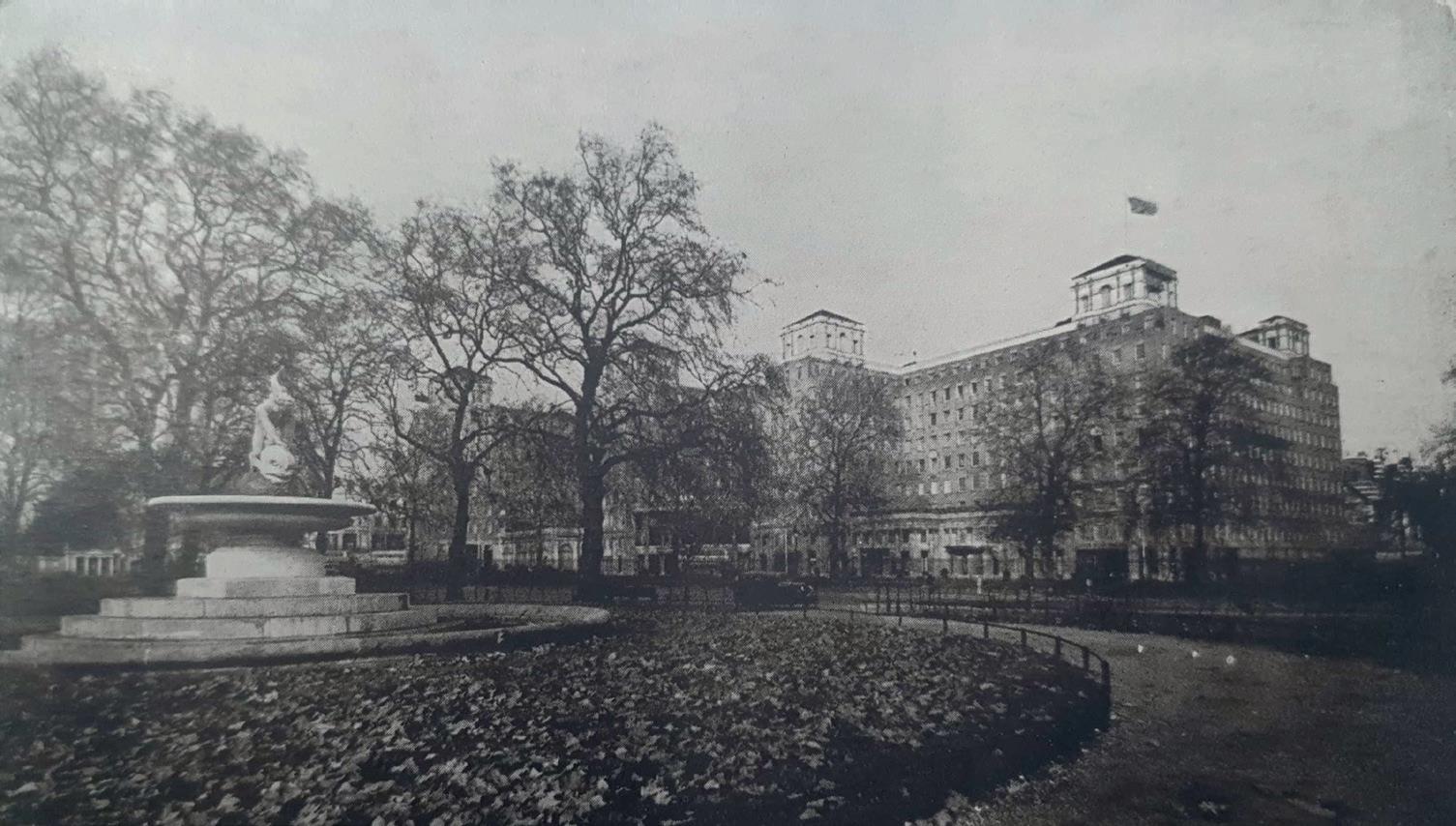
The Civil and Military Gazette reported: “London Reception for Ahmadiyya Chief
“London, Aug. 24 – ‘Turn towards God instead of materialism to attain world peace,’ was the theme at a reception held on Monday afternoon at Grosvenor Hotel here in honour of Mirza Bashiruddin Mahmud Ahmad, head of the Ahmadiyya movement. The reception was arranged by the Ahmadiyya community of Great Britain. Members of the movement arrived not only from different parts of the country to attend the function but also from Africa and the United States.
“Mr Maulood Ahmad Khan, Imam of London Mosque, presented a formal address. Other speakers included Sir Francis Low on behalf of the East India Association, Sir Harold Shoobert on behalf of the Pakistan Society and Rev. Mr Mason on behalf of Central Rotary Club. The Imam emphasised the importance of Islamic spiritual values and hoped that the members of the movement would live up to them and provide an example to others.
“The head of the Ahmadiyya movement expressed pleasure at the high spiritual standard intended to be set up in practice by the community. Since most of the members in Great Britain came from Pakistan he felt sure that their fine example would not only elevate them spiritually but would also be a matter of pride for Pakistan.
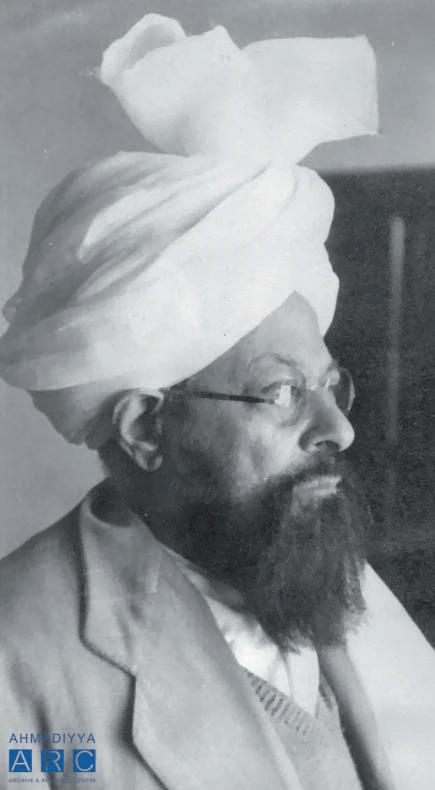
“He hoped that the terrifying atomic destructive forces would be completely harnessed for the benefit of mankind and
the world thus assured of everlasting peace.
Reuters.” (The Civil and Military Gazette, 25 August 1955, p. 2)
During this reception, Sir Francis Low, Sir Harold Shoobert, and Rev. Mr Mason warmly welcomed and expressed their gratitude to Hazrat Musleh-e-Maudra on behalf of the East India Association, Pakistan Society, and London Rotary Club, respectively.
During his speech, Huzoorra called on the members of the Jamaat to follow the Islamic principles in all fields, and as a piece of advice for the people of Pakistan, Huzoorra said that they ought to always keep in mind the interest of their country and to prove their loyalty and honesty through their actions. Advising the Europeans, Huzoorra urged them to pay heed to God Almighty instead of inclining towards materialism. Huzoorra emphasised that if this principle is acted upon, then a peaceful and harmonious society can surely be established. (Al Fazl, 25 August 1955, p. 1)
Hazrat Musleh-e-Maud’sra speech was translated into English by Hazrat Sir Chaudhry Muhammad Zafrulla Khanra
The Civil and Military Gazette reported:
“Ahmadiyya Chief’s Plea for Patriotism
“An impassioned appeal to the people of Pakistan to keep the interests of the country above everything else and to act as patriotic and loyal citizens was made here by Hazrat Mirza Bashiruddin Mahmood Ahmad, head of the Ahmadiyya movement.
“He was speaking at a largely attended reception held in his honour by the Ahmadies of London. Among those present were Sir Muhammad Zafrulla Khan, Judge of the International Court of Justice, Sir Francis Low of the East India Association, the Pakistan High Commissioner, Mr Ikramullah, Mr Muhammad Mir Khan, permanent delegate of Pakistan at UN, the Lord Mayor of London, Sir Harold
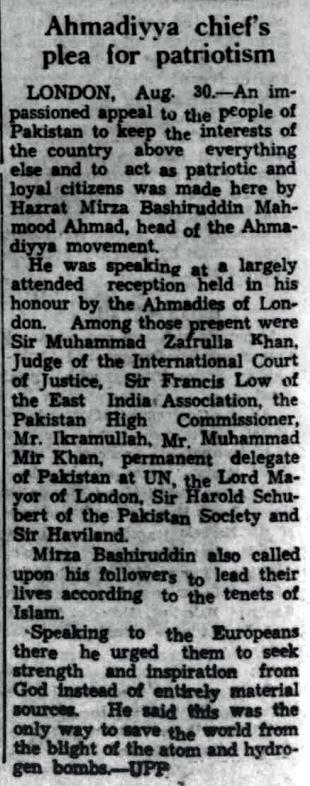
Schubert of the Pakistan Society and Sir Haviland.
“Mirza Bashiruddin also called upon his followers to lead their lives according to the tenets of Islam.
“Speaking to the Europeans there he urged them to seek strength and inspiration from God instead of entirely material sources. He said this was the only way to save the world from the blight of the atom and hydrogen bombs.” (The Civil and Military Gazette, 31 August 1955, p. 4)
11 AL HAKAM | Friday 25 August 2023
–
The Civil and Military Gazette, 31 August 1955 The Civil and Military Gazette, 25 August 1955
An old view of the Grosvenor Hotel, London | Image: Library
Appeal for The Moslem Sunrise and inauguration of a mosque in Ghana
Al Fazl, 21 August 1923
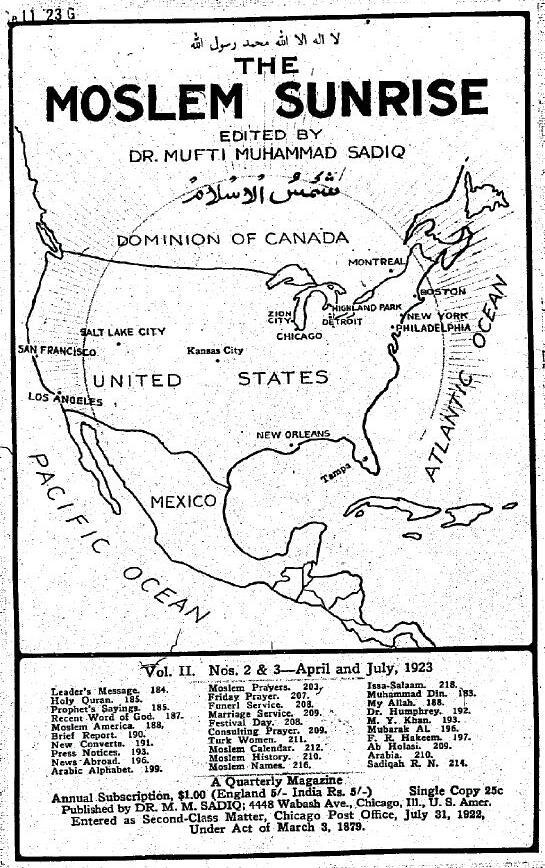
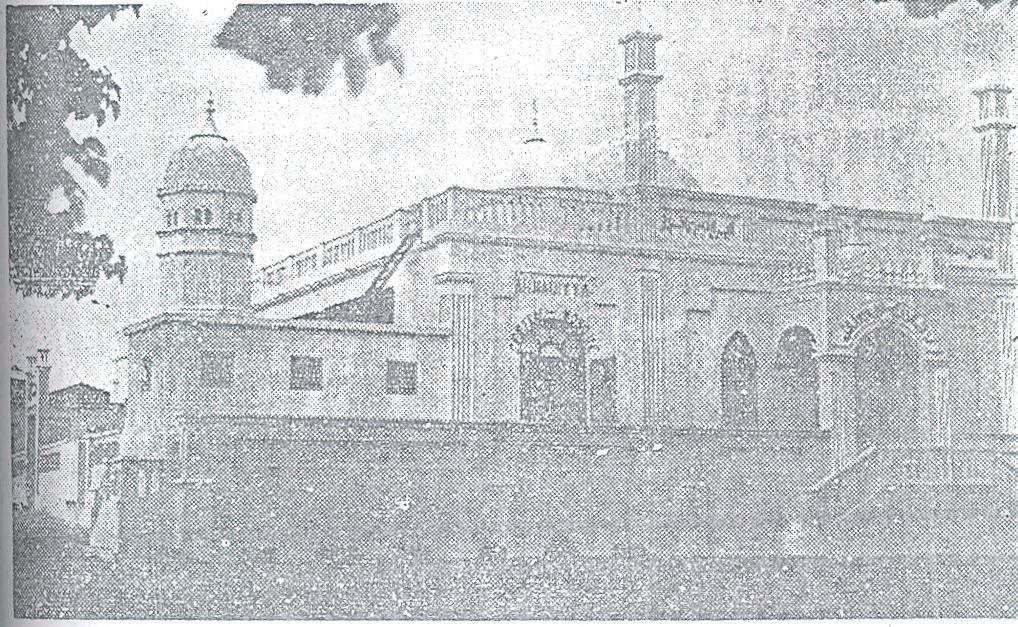
Hazrat Maulvi Muhammad Dinra (1881-1983)
Friends know how the means of the rise of Islam in the West were provided out of nowhere by Allah the Almighty. God accepted the sacrifices and services of Hazrat Mufti Muhammad Sadiq Sahib and made them apparently visible in the form of Moslem Sunrise or Shams al-Islam [Sunshine of Islam]. Through [this magazine, God desired that] the works of Hazrat Mufti Sahib be manifested in the world like the sun and that this star of truth may continue to shine at all times at its highest point.
However, the friends should understand that in the early days, a quarterly magazine was sufficient for the time. But keeping in view the present circumstances and the needs of the country, if it is not prolonged, its novelty value will be lost. For example, the wonders of the world also have an attraction, but that too does not last long.
It [America] is a Christian country, and we are competing with the missionary magazines here. Every day, new articles are published against Islam. If they are not responded to, it has a bad effect, and if the response is given after a long time, it is equivalent to not answering at all. [Newspaper] announcements cannot achieve in this country what a regular magazine can accomplish. Day by day, the needs of our Jamaat here are increasing. The teaching work of our members is also being done through this magazine. If it is published after a long period of time, many people will forget their previous lesson.
Here, the situation is such that when we eventually got in touch with some newspapers, they did not send their paper again, because they did not receive our magazine for three months and thought it was closed.
Sometimes, due to a lack of funds, the magazine is delayed. As it happened now that it has been published after six months. The subscribers also start to dwindle, and most people eventually get frustrated.
If there is no progress in a work, it eventually regresses. On the other hand, work begins to collapse if there is regression instead of advancement. Therefore, in my humble opinion, Moslem Sunrise should be a monthly magazine, and only then can it become an organ [of the Jamaat in America]. At present, an organ is very much needed for a mission. If it is not published on a monthly basis, it cannot become an organ. Moreover, a mission cannot fully succeed today without an organ, especially in the Western world, where all work requires publicising.
The question of expenses is indeed difficult, but there is an easy way out. That is, if at least 3000 regular subscribers
Cover page of the Moslem Sunrise
can be achieved, this magazine will easily be published without delays. Its annual subscription will be set at around 6 or 7 rupees. At present, its annual cost is five rupees. If there are 3000 subscriptions, raising its price to 6 rupees per year means that there will be an increase of only one rupee or at most two rupees. And this is not a huge increase in price. If all the anjumans of the Jamaat make special efforts for this purpose and the affluent friends contribute generously to this cause and send a total of 3000 subscriptions, it is hoped that this magazine will stand on its own two feet and become a monthly.
It should be noted that I have stipulated a minimum of 3000 subscribers. It should not be misunderstood that we are requesting 3000 rupees. Around 2000 rupees would be enough for this purpose. I did not ask for 5 or 6 thousand rupees because, hearing this kind of request, some friends might be taken aback.
At the aforementioned price, it is impossible to find such a magazine in the religious circles of India. Political magazines can, of course, be found, but as they are bought in large numbers, they can be made available at low prices. Moreover, this magazine will be especially helpful for English readers who are fond of learning Arabic. After reading this magazine, those who are familiar with English letters will be able to learn to read Arabic in Roman English within a short time. Eventually, they will be acquainted with Roman [English], but this is not relevant to the topic under discussion. In short, the magazine will be able to do very beneficial work. If [the funds] are made available, we will be able
to add one or two pages of Arabic, Persian, and Turkish with it, as we are receiving many such requests through letters. Especially from Iran and Turkey, letters are being received. It is hoped that friends will seek reward by participating in this good work. All contributions and letters for this purpose should be sent to “In-Charge Almasjid Chicago”.
Muhammad Din, 4448 Wabash Avenue, Chicago, Illinois, USA.
Ahmadiyya Mosque in Saltpond, Ghana
Al-Haj Hakim Fazl-ur-Rahman (1901-1955)
Work difficulties
Brothers, assalamu alaikum wa rahmatullahi wa barakatuh!
It has been a year and a half since I left Qadian Darul Aman [Abode of Peace]. Soon after coming here [to Africa], I started working. Every brother who has had the opportunity to take part in any important task can understand the difficulties one has to face in a new work. Especially if a person is weak, ignorant, and inexperienced like me, they have to endure even more hardships.
A man’s weaknesses could be covered if he had to work among his friends or in his own country. In a place where a person is familiar with their language, habits, and culture, his work becomes much easier. Keeping this whole situation in mind, friends may well understand my difficulties as I have to work among the people of a
foreign country with a foreign language, and foreign habits.
The geographers have termed Africa the “Dark Continent” [….] However, by the grace of Allah the Almighty, having complete faith in the prayers of Hazrat Fazl-e-Umar [Khalifatul Masih IIra] and our friends, the work has been started [in Africa].
Fruits of tabligh efforts
I cannot say that I have completely fulfilled my responsibilities; no, I have not even fulfilled one-hundredth of my duty. All praise belongs to Almighty God that where more than two hundred disbelievers and Christians have entered Ahmadiyya Jamaat in the last year, and the reformation and edification of the previous members have also taken place.
When I arrived here [in Saltpond, Ghana], I found the new converts in a strange state. The reason is obvious that no teacher could be sent to them immediately for their edification. On reaching here, I found the condition of these people to be so low as to be unimaginable. Whether in terms of knowledge or in terms of habits and morals, they were weak in every way. [...] Regarding moral and religious weakness, they cannot be blamed because the early Hausa Muslims can be seen in the market drinking alcohol, dancing, and collecting money by writing amulets. And when the former Muslims have set this example, what will happen to the new converts? In fact, they are the enemies of Islam, and seeing them, the people of the African coastal areas are becoming frustrated, nay, hating Islam. However, Allah the Almighty helped me and made those people understand. By the grace of God Almighty, there are now a great number of people who have brought
Friday 25 August 2023 | AL HAKAM 12
100 Years Ago... Continued on next page >>
An old mosque in Ghana | Image: Library
Light pollution, Holy Quran and Latter Days Opinion
about a positive change in themselves and are sincere in their faith. Moreover, they have now understood what Islam really is.
I have mentioned these few preliminary points so that Ahmadi friends can understand my difficulties.
Ahmadiyya Mosque of Saltpond
What I want to mention particularly in this report is the special blessing of Allah the Almighty that He showered upon us in the form of the inauguration of the Ahmadiyya Mosque in Saltpond, [Ghana] on 29 May [1923]. A mosque built by the non-Ahmadi Hausa Muslims of this place left and moved to another place. The land on which the mosque was built is owned by a Christian, and the Hausa people used to pay rent for it. When those people left, the owner of the land asked to demolish the mosque because it was of no use to him, except that he could have utilised the debris of this mosque and brought it to work, but when I met him, this good-hearted person gave permission to use this mosque and, for the time being, gave it to me for free. The cost of the land and the mosque together is no less than fifteen hundred rupees. May Allah the Almighty grant him the best of rewards.
This mosque is very far from my house. Moreover, there is no proper jamaat in this region of Saltpond. There are only a few [Ahmadi] schoolboys in this area. Currently, I have started leading Fajr, Asr, and Isha prayers there. Friends are requested to pray that Allah the Almighty may also increase worshippers in this mosque.
I used to pray to be granted both a mosque and a jamaat. Allah the Almighty has blessed us with a mosque. By God’s grace, the time is not far when we will be granted a jamaat as well. Therefore, from the day I started leading the prayers there, non-Ahmadis have also started praying behind me, and what is interesting is that they pray exactly like we do.
The jamaat here is seriously considering the matter of building a house for the Ahmadiyya Mission near the mosque. Therefore, I have requested land for the house from the same Christian friend who gave us the mosque. Now, by gathering the jamaat in a jalsa and coming to a conclusion on this matter, if Allah the Almighty grants us the strength, we desire to build a [mission] house within this year. Friends should help us with their prayers. People are sending money to London, America, and Germany, so please at least send bags of prayers to us.
(Translated by Al Hakam from the original Urdu, published in the 21 August 1923 issue of Al Fazl)
Jazib Mehmood
Jamia Ahmadiyya International Ghana
Stars have long held the gaze of many a wanderer. Before modern means of navigation, stars helped guide explorers and travellers to their destinations and were therefore enormously important in the lives of early humans. Allah the Almighty attributes this to Himself, stating:
“And He it is Who has made the stars for you that you may follow the right direction with their help amid the deep darkness of the land and the sea.” (Surah al-An‘am, Ch.6: V.98)
But stars have also served a more symbolic purpose in the life of the pondering Man. People will relate to looking up at the stars every once in a while and thinking about our place in the universe. This is also related in the Holy Quran in the following words:
“And We have, indeed, made mansions [of stars] in the heaven and have adorned it for beholders.” (Surah alHijr, Ch.15: V.17)
But lately, it has been difficult to do so. Over a third of all people on Earth can no longer view the Milky Way from where they live because of artificial light.
Earlier this year, a report by The Guardian revealed that light pollution is now causing the night sky to brighten at a rate of around 10% a year, an increase that threatens to “obliterate the sight of all but the most brilliant stars in a generation.”

( www.theguardian.com/science/2023/ may/27/light-pollution-threatens-to-makestars-invisible-within-20-years)
This problem is not new. Since the 20th century, cities like London began to experience the first signs of light pollution. (Mount Wilson Observatory: the sad story of light pollution (2004), Garstang, R. H., The Observatory, Vol. 124, p. 14-21)
The following verse of the Holy Quran could possibly be interpreted as referring to light pollution:
تردكنا موجنلا اذإو
“And when the stars are obscured.”
(Surah at-Takwir, Ch.81: V.3)
تسمط موجنلا اذإف
“So when the stars are made to lose [their] light.” (Surah al-Mursalat, Ch.77: V.9)
The word ردكنا also means “It was or became turbid or muddy; it ceased to be clear.” (Dictionary of the Holy Quran, Malik
Ghulam Farid, p. 716) Moreover, In the Five Volume Commentary, we read the following explanation of the word “تسمط” under verse 77 of Surah al-Murasalat:
“
مجنلا سمط means, the star lost or became deprived of its light. موجنلا ميغلا سمط means, the clouds concealed or covered the stars. (Lane & Aqrab).”
At the time of the revelation of the Holy Quran, the skies offered no sign that there would come a time when it would ever be difficult to view the night sky. And yet, this verse speaks of our well-lit kingdoms of civilisation, where it is becoming increasingly harder for people to view the night sky in all its starry glory.
Hazrat Musleh-e-Maudra has given several meanings of this verse of the Holy Quran, which states:
تردكنا موجنلا اذإو
“And when the stars are obscured.” (Surah At-Takwir, Ch.81: V.3)
One meaning of this verse, he writes, is that a time would come when stars, i.e., meteorites, would fall in large numbers. Another meaning is that meritocracy would replace aristocracy. Another meaning is that religious scholars would no longer command much respect, as their knowledge would be dry.
Then, as the Holy Prophet has also referred to his companions as stars (Mirqatul-Mafatih Sharah Mishkat-ul-Masbih, Kitab al-manaaqib, Hadith 6018), another
meaning of this verse would be that the companions would no longer be followed in virtue and righteousness, and their example would no longer be mentioned by their followers, i.e., the Ummah. (For detailed meanings of this verse, please refer to Tafsire-Kabir, Vol. 8, pp. 200-203.)
But why speak of this? These are indeed remarkable prophecies about the Latter Days, but what does that mean for us? The answer, we may safely conclude, adds to the long list of signs mentioned in the Holy Quran about the advent of the Promised Messiah.
There are many other such prophecies that describe how the Latter Days would take shape. Such signs include modern transport, progress in global communication etc. However, the fact that the Holy Quran – in three short words – has described the Latter Days with such clarity, especially when such a thing was unimaginable in 7th-century Arabia, is simply fascinating.
The Promised Messiahas and his Khulafa have always encouraged us to follow the great examples of the companions of the Holy Prophetsa. In his Friday sermons over the last few years, Hazrat Khalifatul Masih Vaa described in magnificent detail the virtues of over 300 companions of the Holy Prophetsa. With this, he prayed that we might follow their example and hence once again glisten spiritual skies with the tapestries of stars.
13 AL HAKAM | Friday 25 August 2023
ربلا تاملظ ي اهب اودتهتِل موجنلا مكل لعج يذلا وهو نوملعي موقِل تايآلا انلصف دق رحبلاو
نيرظانلِل اهانيزو اجورب ءامسلا ي انلعج دقلو
<< Continued from previous page
Yong Chuan Tan | Unsplash
Friday Sermon
Hadeeqatul Mahdi, Alton, UK
28 July 2023
Jalsa Salana UK 2023: Guidance and Advice
After reciting the tashahhud, ta‘awwuz and Surah al-Fatihah, Hazrat Khalifatul Masih Vaa stated:
By the grace of Allah the Almighty, the Jamaat-e-Ahmadiyya UK’s Jalsa Salana is commencing today. By the grace of Allah the Almighty, the Jalsa has been taking place here in the presence of Khilafat for approximately the last four decades. Initially, the Jamaat here in the UK had a lot to learn due to the large-scale preparations, for which Hazrat Khalifatul Masih IVrh paid personal attention and imparted guidance. And, alongside that, experienced individuals were also called from Rabwah to teach the work, among whom was Afsar Jalsa Salana, Chaudhary Hameedullah Sahib, who provided a lot of assistance.
In 1985, the first annual gathering took place here [in the UK] in the presence of Hazrat Khalifatul Masih IVrh. Prior to it, a Jalsa was held in 1984, but it was on a very small scale – however, the first formal Jalsa took place in 1985 and had an attendance of perhaps only 5,000 people, yet despite that, the administration at the time was very worried. Everyone was worried as to how they would be able to manage all the arrangements. But now, by the grace of Allah the Almighty, the attendance at the ijtemas of Khuddam-ul-Ahmadiyya [UK] alone, or that of Lajna Imaillah [UK] is much greater than that, and these auxiliary organisations are able to organise these events in an excellent manner. Hence, the UK Jamaat has become very well-experienced with regard to making all these various arrangements.

Seeing as there has been a three to four years break since a full-scale Jalsa has taken place, the administration was concerned on this occasion once more as to whether or not they would be able to cater for the predicted attendance of over 40,000 people. However, by the grace of Allah the Almighty, I am hopeful that the workers will be able to tend to their duties in an excellent manner. Masha-Allah, those who live here, in fact, even those who were born and raised here and have now reached an age of maturity, have become experienced enough to fulfil their duties in the best manner.
Last Sunday, I inspected the arrangements that had been made until
that point, and by the grace of Allah the Almighty, I found the workers in every department to be well-prepared and aware of their roles. Thus, with Allah the Almighty’s grace, all the concerns were alleviated. As for the concern of the administration that there could be some shortcomings due to the Jalsa being organised on a large-scale once more after a break, insha-Allah, these worries of the administration will also be removed, on the condition that our focus always remains on drawing the blessings of Allah the Almighty. No work of ours is completed through one’s mere aptitude or experience, rather, it is purely out of the grace of Allah the Almighty. In the previous sermon, I also briefly mentioned that, in accordance with the teaching of Allah the Almighty and His Messengersa, each and every person on duty and those in charge must carry out their duties with hard work, excellent morals, prayers while seeking the help of Allah Almighty.
When this happens, then Allah the Almighty will shower His blessings. We have presented ourselves to selflessly serve the guests of the Promised Messiahas, who have travelled here purely for a religious purpose.
Thus, I reiterate once again to the workers that the passion with which you have presented yourselves to serve, you must continue to uphold this same passion for however long you are serving in your respective duties. Where you are fulfilling the rights of serving the guests, never forget this fact that we must also fulfil the rights of worshipping Allah the Almighty; we must safeguard our prayers and we must strive to make ourselves pure by deriving benefit from this atmosphere at every moment. Having done true justice to your duties, you should never think that you have fulfilled your objective. Without worship, our objective cannot be achieved. Thus, those children, youth, men and women that are
on duty, should also remember to fulfil this right [due to Allah the Almighty] as well.
After this, I wish to also say a few things today to the guests as well who have come to the Jalsa. Every attendee of the Jalsa should always bear in mind that they should not regard the things I am about to say as mere formality; that I have simply said them and you have heard them and that is enough; that should not be the case. In fact, it is necessary to implement these as well. The first, and most important matter is that all those who have come here to participate in the Jalsa should remember the words of the Promised Messiahas that this Jalsa is not like other worldly gatherings. (Shahadatul Quran, Ruhani Khazain, Vol. 6, p. 395)
The purpose for which we are attending the Jalsa is to improve our spiritual, intellectual, and moral condition and also to establish the love of Allah the Almighty and His Messengersa in our hearts. If one adopts this mindset, one will not remain
Friday 25 August 2023 | AL HAKAM 14
focused on worldly things. And when one’s focus is not on worldly things, then even if there are certain shortcomings in certain arrangements of the Jalsa, the guests will not even feel them; they will think that even if there is any shortcoming on the part of their hosts or the organisers of the Jalsa, it makes no difference to them. Their purpose is solely to improve their spiritual and intellectual condition, which can be achieved by benefitting from the proceedings and speeches of the Jalsa.
Hence, the first point is that every attendee of the Jalsa should ensure that they do not wander about during the Jalsa and instead listen to the entire proceedings of the Jalsa. Then, during the breaks between the Jalsa sessions for food, prayers and meeting with friends, that time should also be used in the most efficient manner. If there is some free time, it should not be spent simply shopping at the bazaar; rather, the Ishaat Department has set up stalls for the Jamaat’s books, which should be visited. Similarly, various central departments have exhibitions, such as Makhzan-e-Tasaweer, The Review of Religions, Tabligh and the Archive Department [Ahmadiyya ARC]. You should visit these and improve your knowledge of faith and history.
In short, you should separate yourself entirely from worldly endeavours and strive to improve in your faith and knowledge. When this happens, it will also improve mutual love and relations. Even if there are shortcomings in the administration or the hosts, then they will not be felt. A beautiful atmosphere will be established, which will reflect a true atmosphere of believers. If we do not achieve this, then we cannot create the atmosphere that is the objective of the Jalsa. If people begin searching for weaknesses and start complaining, then in such a large-scale and temporary operation, dozens of complaints can arise, as there cannot be perfection. There may be many shortcomings that can cause restlessness. For example, the Department of Food aims to provide the guests with every possible ease when it comes to serving food by ensuring that there is no shortage of the food being served or by having volunteers on duty try to serve the guests while exhibiting the highest morals. However, at times, there could be a discrepancy in the estimation and there may not be an adequate amount of food available, but rather than expressing anger, the apologies of the workers should be accepted wholeheartedly. I will present an incident from the life of the Promised Messiahas that illustrates the example he set for us in such a situation.
On one occasion, the Promised Messiahas was on a journey and was engaged in his work and thus he did not eat dinner at the time it was being served to the other guests. The workers must have laid the food out and then later cleared it up without realising whether the Promised Messiahas had eaten or not. The organisers also did not pay attention as to whether the Promised Messiahas had eaten, as he was busy with his work. Nonetheless, later in the night, the Promised Messiahas felt hungry and asked if there was any food, upon which the workers became extremely worried. They became worried because all the food had been eaten by the other guests and the workers and there was nothing left. It was late at night and the shops were closed as
well, so nothing could be ordered from a local food shop either. The Promised Messiahas somehow came to learn that the food had finished and that the organisers were anxiously working to quickly cook something. The Promised Messiahas said, “There is no need to be worried. There must be some leftover pieces of flatbread on the table, just bring those.” And so, he ate those leftover pieces of flatbread and comforted the workers. The narrator says, “Had the Promised Messiahas instructed for food to be cooked at that very instance, then it would have been a source of honour for us, and we would have done so with great pride, seeing it as another opportunity to serve, which is full of blessings. However, he felt that it would be difficult for us to do so and stopped us, saying that there was no need.” (Sirat Hazrat Masih-e-Maudas [2016], Hazrat Sheikh Yaqub Ali Irfanira, p. 322)
Thus, this is an example that we should keep in mind. If we do not arrive at the scheduled times for food, then we should not have any complaints and we should eat whatever is available. Sometimes, when the salan [stew] finishes, some lentil soup is cooked quickly – as it is easy and quick to make – so that no guest is left hungry. Hence, the guests should also eat it happily. Similarly, the Promised Messiahas also taught the lesson that food should not go to waste. The Promised Messiahas knew that people leave pieces of flatbread, which is why he asked for those to be brought so that he could eat them. Here as well, I will say to the guests that those making the flatbread do their level best to make the best possible flatbread, however, it is possible that in some instances there are some that are a bit undercooked or some that are a little burnt, and so only in extreme circumstances they can be left [to not eat], however, generally this should not be the case. If there are some minor differences in the quality of the flatbread, it should not be wasted. There is a roti plant operating here where volunteers work with great time and effort and every year, they make new improvements as well. The guests should remember that the people cooking the food or making the flatbread are not professionals in these fields; rather, they are volunteers who come from different professions, and so the sincerity and passion with which they serve should always be appreciated. To display a high standard of morals, being kind, meeting each other with a smile and making sacrifices for others is not the sole responsibility of volunteers; rather, the guests should also be especially mindful of this. Without morals, there is nothing. A peaceful atmosphere cannot be established through the good morals of the workers alone; rather, all attendees of the Jalsa must exhibit good morals. Both the ladies and the men should remain mindful of this. Previously, I referenced a Hadith that smiling is a part of faith or that smiling is a form of charity. (Jami‘ at-Tirmidhi, Hadith 1954)
This should always be remembered.
With regard to the expectations of the Promised Messiahas when it comes to the standard of high morals displayed pertaining to guests at the Jalsa, the Promised Messiahas states:
“I say most truly that a person’s faith can certainly not be complete until one prefers the comfort of his brother over that of his own as far as possible. If a brother of mine
sleeps on the floor in front of me, despite being weak and ill, whereas I, being hale and healthy, take possession of the bed so that he may not sit on it, then how pitiable is my condition. And how sorrowful would be my condition if I were not to get up and give the bed to him by way of love and compassion, preferring the floor for myself. If my brother were to be ill and suffering from some pain, then how pitiable would my condition be if in such a situation I would be sleeping comfortably and would not try my best to bring him relief and comfort. And if some brother in faith of mine speaks harshly to me out of haughtiness (this is very important for the Jalsa), how pitiful would it be if I, too, wilfully and knowingly, respond to him harshly. I should, on the contrary, patiently bear what he says and earnestly supplicate for him in my daily prayers, crying and weeping, for he is my brother and is spiritually ill. If my brother is naive, or not very learned, or makes a mistake out of naivety, I should not ridicule him or hastily frown at him in anger, or tell others of his shortcomings out of ill intention. All these are ways to destruction and no one can become a true believer unless he is tenderhearted and until he considers himself to be the most lowly in comparison with all others and unless all his haughtiness is far removed. Being of service to people is a mark of distinction for those who truly serve their people. And speaking to the poor in a kind manner while bowing humbly is the characteristic of those accepted by God. And responding to mischief with beneficence is the sign of good fortune. And suppressing anger and tolerating harsh words are acts of extreme courage.” (Shahadatul Quran, Ruhani Khazain, Vol. 6, pp. 395-396)
This was general guidance that the Promised Messiahas gave to his followers. These are the basic moral traits that should be exhibited at all times, especially during the days of Jalsa. If we act upon these teachings during these three days, then, at least to some degree, we will develop the habit of acting upon them in our daily lives. However, this is conditional upon having the intention of attending the Jalsa to improve in terms of spirituality and morals. By reflecting upon what one learnt by attending the Jalsa, one can then perpetually establish a beautiful society wherein one seeks to fulfil the rights of others. To give precedence to another over oneself is not an easy task, it requires great struggle. This is why the Promised Messiahas said that this matter is related to faith. Such a person’s faith cannot be complete who does not possess within them the quality of sacrificing their own desires and fulfilling the rights of others. Allah the Almighty does not decree one to be worthy of great reward simply on the basis of small things, in fact, He bestows in abundance upon those who excel in striving. Fulfilling the rights of others is a very difficult task, and that is why the Promised Messiahas states:
“A person may be able to fulfil the rights owed to Allah, but fulfilling the rights of others is very difficult.” (Malfuzat [1984], Vol. 8, p. 19)
And so, everyone should adopt the mindset of giving preference to their brothers over themselves. If every one of us adopts this mentality with the thought that the rights of others must be fulfilled in order to attain the pleasure of Allah the Almighty, then society will become one of
love and affection. The expression of this love and affection will not only remain limited to the three days of Jalsa; rather, one’s entire life becomes an example of love and affection. How beautiful indeed is the guidance that the Promised Messiahas gave for the establishment of such a pure society. He said that it would be pitiful if someone were to speak harshly, and his response was just as harsh. Instead of responding harshly, he should pray for him. This is the society that Islam seeks to bring about, and that the Promised Messiahas desired to see in his followers. The Promised Messiahas has so beautifully stated that if bad qualities are found in a person, then they are spiritually ill, and it becomes one’s responsibility to cure them or see to it that they are cured. This is not just for the reformation of others but also for one’s own reformation. In fact, this applies more to us as compared to others, because one can only cure the spiritual illness of another when that person themselves is first cured of that very illness. Hence, in order to avoid these ills, we must avoid finding faults in others, become tender-hearted for others, and eradicate any arrogance from within us.
Hence, both the hosts and the attendees of the Jalsa must carefully ponder over this. If we strive to overlook each other’s faults and establish an environment of peace and compassion, then these three days will achieve the purpose for which we have gathered here. At times, enmities arise over the most trivial of matters, which brings about an atmosphere where people berate one another or sometimes escalate to the point of physical altercations. If this is the environment people desire and they do not want to control their emotions, then it is better that they do not attend the Jalsa. Similarly, if the duty holders cannot control their emotions, then they should not perform duties. Difficulties arise, especially when it comes to traffic, as there is limited space for parking. Parking is made available according to the number of cars, but perhaps this year perhaps there will be more cars, so the space for parking will be limited. If some people are sent to different sites [for parking], then they should show cooperation. Generally, by the grace of Allah the Almighty, people are cooperative because this is how the members of the Jamaat have been trained. However, there are some people who are short-tempered, or who think that they will miss part of the programme of the Jalsa if they are sent to a different site because they will be delayed in getting to the Jalsa site. Such people should remain mindful of the limitations of the organisers. If they are so concerned about attending the Jalsa, then they should arrive ahead of time. Also, those on duty should try to explain things to them in a loving manner instead of arguing with them. May Allah the Almighty make it so that not a single instance of people being harsh to one another arises. May Allah the Almighty enable the guests to avoid putting the workers through any sort of trial and may Allah the Almighty grant forbearance to the workers. May Allah the Almighty make it so that these three days are not simply limited to singing poems of love and affection, but that the training obtained during these three days sparks the establishment of such a society that fosters an environment of love and affection, which is the hallmark of an
15 AL HAKAM | Friday 25 August 2023
Islamic society.
The Promised Messiahas has constantly drawn our attention on various occasions towards developing such pure thoughts of virtue and piety. In one instance, while advising guests about their responsibilities and drawing attention towards developing pure thoughts, the Promised Messiahas states:
“One should carry out acts of virtue solely for the sake of pleasing God Almighty and fulfilling His commandments, regardless of whether it yields reward or not. Faith can only be complete when such a thought and idea [of attaining reward] is eliminated.” In other words, one should not think about doing such things only for the sake of attaining a reward. No. In fact, it should be done to attain the pleasure of Allah the Almighty. The Promised Messiahas states, “Although it is true that God Almighty does not let any act of virtue go to waste:
�ينسحملا رجا عيﻀي �ل ���ا نا
‘Surely, Allah suffers not the reward of those who do good to be lost.’ [Ch. 9: V.120] However, the reward should not be the goal of those who do good. If a guest comes here only because they think that they shall be able to relax, they will be provided with cold drinks, or they will be presented with luxurious food, then they have come solely for these things. However, it is already the host’s responsibility to be as hospitable as they possibly can and avoid any shortcomings in this regard and provide as much ease as possible, and certainly, they do. However, for the guests to have this expectation themselves is a source of harm for them.” (Malfuzat [1984], Vol. 2, pp. 371372)
This is the mindset that guests should remain mindful of. There are some guests who do not have relatives here [in the UK] and so they stay in the Jamaat accommodations. However, sometimes they make such demands for accommodation that they are difficult to fulfil. Similarly, there are other amenities that cannot be provided; the organisation of Jalsa Salana is so vast that it is impossible to provide such things. Most people are understanding in this regard. Just two days ago, a family came to meet me who, despite having informed the administration well in advance, due to some miscommunication, could not be provided with the accommodation they desired. And so, they made their own arrangements at a relative’s home. Despite their relative’s home being very small due to which they had to lay mattresses or sheets on the ground to sleep on, and both the hosts and the guests would have faced difficulty, however, they were still happy because they knew they would at least get to attend the Jalsa. They said these things in a jovial manner and even then, it was only after I asked them about it; they didn’t make any complaints. This is the conduct of most guests. There are others who come to meet me, and knowing their disposition, I do not think that they will be able to stay under the Jamaat accommodations, yet they happily stay in them despite me thinking the opposite that perhaps they will not be able to stay there. But they do, and they do so happily, and the
majority of the people are like this. But there are also those who complain a great deal. If they were to spend these days cheerfully for the sake of Allah the Almighty, then Allah the Almighty will bless them in other ways. As for the accommodation arrangements here, whether in tents or communal spaces, I believe they have all filled up due to the large number of people. And so, it is possible that such arrangements will have to be made that may cause some difficulty, but even those arrangements should be happily accepted by the guests. In any case, as the Promised Messiahas has stated, it is the responsibility of the hosts to ensure as much as possible that the guests are afforded ease, and may Allah the Almighty grant the best reward to the guests for enduring minor difficulties. They should keep this in mind and try to seek [the ability to do this] from Allah the Almighty.
What is the teaching of the Holy Prophetsa regarding the establishment and spread of peace and security in society? Once, a person went to the Holy Prophetsa and said, “O Messengersa of Allah! What is the best Islam?” The Holy Prophetsa replied, “To feed the needy and to say ‘Salam’ to everyone, whether you know them or not.” (Sahih al-Bukhari, Kitab al-Iman, Hadith 12). This is the beautiful principle for establishing love and brotherhood, peace, and security in society, which, if implemented, can bring about a society that fosters peace and security. Much of the unrest in the world is due to the poor becoming poorer. Even today, there are millions of people who do not even get two meals a day. If they eat, then they don’t have a home. These things are found even here, in countries like the UK, which are considered to be wealthy nations – although they no longer have the same wealth as before. Still, they are far better than many others, however, there are thousands of people, even children, on the streets because they are unable to find food or housing due to inflation. It is a fundamental teaching of Islam to feed the hungry. If only Muslims understood this principle and their leaders honoured the rights of their people and rather than gathering wealth for themselves, they fulfilled the needs of the poor and needy, thereby removing the restlessness and injustices from society! These days, much of the restlessness is spreading because of this very reason.
Then, the Holy Prophetsa instructed to say “salaam”. (I have simply stated [the above] as an additional point.) The Holy Prophetsa instructed to make the greeting of “salaam” common in society. Conveying “salaam” is not a mere verbal utterance; rather, when a person says “salaam” from their heart, they also actively think about conveying and spreading peace. Such people also have positive sentiments for one another and they strive and pray to remove others’ difficulties. Thus, during these days, every Ahmadi should strive to spread the message of peace, make a habit of saying “salaam” and establish mutual sentiments of positivity. People very happily meet and courteously say “salaam” to those who render them some sort of benefit, or they very happily meet those with whom
they have a relationship. But true peace and security is established when people who harbour enmity towards one another remove that enmity and the prayer of peace for one another emanates from their hearts. During this Jalsa, such people should endeavour to remove their enmities and convey peace and they should generally spread peace throughout the entire atmosphere. May Allah the Almighty enable everyone to act upon this and may the environment of Jalsa be one of peace and security; may high morals and fulfilling the rights of others become a permanent aspect of our lives.
I also wish to draw attention toward some general points pertaining to the arrangements of the Jalsa that everyone should bear in mind.
The first point is that you should try to listen to the proceedings of the Jalsa quietly and attentively. It should not be the case that you listen to some speakers and not others. I have mentioned before as well that you should come and sit [attentively] at the Jalsa. The Promised Messiahas has expressed great displeasure over the fact that people listen to some speakers because of preferring their passionate oratory, but then they do not listen to others. (Malfuzat, Vol. 1, pp. 398401) The speakers prepare their speeches with great effort. All the attendees of Jalsa should participate in the entire programme of the Jalsa and strive to attain spiritual and intellectual benefits.
Then, you should also pay special attention to the remembrance of Allah and invoking salutations upon the Holy Prophetsa [durood] during the days of Jalsa. We are currently passing through the days of Muharram, and today is the 10 Muharram and durood should be recited. It should be recited with the thought that Allah the Almighty may continue elevating the status and rank of the Holy Prophetsa; that He may continue granting his message success and victory; that He may make his Divine Law lasting and grant it supremacy; that we may benefit from the prayers he made for his ummah [nation] and that Allah the Almighty may save this ummah from all forms of deterioration. Today, what is there that Muslims are not doing in the name of Allah the Almighty and His Messengersa They have defamed Islam. May Allah the Almighty grant them understanding and may they accept the Imam of the Age. Prayers are [especially] accepted on Fridays, so keep this in mind when you are praying. On this day, it was in the name of Allah the Almighty and His Messengersa that socalled Muslims inflicted cruelties upon the spiritual and physical progeny of the Holy Prophetsa. Now, these people are inflicting the same cruelty upon the spiritual progeny of the Holy Prophetsa and the Community of the Promised Messiahas. The situation in Pakistan these days is extremely painful; opponents are trying to cause harm to the Jamaat from every direction and they claim to be doing so due to their love for the Holy Prophetsa and that, God-forbid, Ahmadis are guilty of committing blasphemy against the Holy Prophetsa. However, our faith is rooted in the fact that the Holy Prophetsa is the Seal of the Prophets and that it is necessary to believe in that law that he brought. In
reality, we are those who hearkened to the command of the Holy Prophetsa and accepted the Promised Messiah and Imam Mahdi who was to come. Regarding the degree to which the Promised Messiahas loved the Holy Prophetsa and Allah the Almighty’s blessings upon him as a result, the Promised Messiahas states:
“Once, it so happened that I was completely immersed in reciting durood, in other words, sending salutations upon the Holy Prophetsa for an extended period of time. I was convinced that the paths of God are very fine and the only way to find them is through the Holy Prophetsa, as God states:
ﺔليسولا ﻪيلا اوغتباو
[“And seek the way of approach unto Him’ (Surah al-Ma’idah, 5:36)]. Then, after a while, I saw in a vision that two water carriers came, one entered my home from an inner path, and another entered my home from the outer path and they were carrying vessels of light on their shoulders (they were not filled with water, but with light), and they said, دمحم ىلع تيلص امب اذه.” (Haqiqatul Wahi, Ruhani Khazain, Vol. 22, p. 131, [footnote])
That is, “The reward of this light is because you are sending salutations upon the Holy Prophetsa.”
This was the degree to which the Promised Messiahas loved the Holy Prophetsa, and this was how Allah the Almighty rewarded him. The Promised Messiahas has expressed on countless occasions that whatever he attained was through the Holy Prophetsa, sending salutations upon him and being immersed in his love. How then can it be considered that he strayed from the Holy Prophetsa? In any case, during these days, along with the remembrance of Allah the Almighty you should also especially focus on reciting durood. May Allah the Almighty soon spread those blessings throughout the world which He promised to the Holy Prophetsa
Whilst in the Jalsa marquee, the ladies especially should ensure that they instil in those children who possess some understanding that they should sit quietly during the Jalsa sessions. It is the training that is done at a young age which remains firm in the mind. Those women who sit in the children’s marquee should also try not to speak too much and instead should focus on the proceedings. Sometimes the complaint is received that the children do not make as much noise whereas the women use them as an excuse to converse more amongst themselves. Due attention should be given to this.
Similarly, as it pertains to security, every attendee, both on the men’s and ladies’ sides should remain aware of their surroundings. This is an important method of security. Similarly, you should carefully read the guidance that is found in your programmes and act upon it as well. May Allah the Almighty enable everyone to benefit from the Jalsa in the best way, safeguard against every evil and shower us with His mercy and blessings. [Amin]
(Official Urdu transcript published in the Daily Al Fazl International, 18 August 2023. Translated by The Review of Religions)
Translations:
Friday 25 August 2023 | AL HAKAM 16
Editor-in-chief: Qaasid Muin Ahmad | Executive editors: Ataul Fatir Tahir, Aqeel Ahmed Kang | Research coordinator: Awwab Saad Hayat | Associate editors: Jalees Ahmad, Ata-ul-Haye Nasir
M Adam Ahmad | Design: Tahmeed Ahmad | © Al Hakam 2023



















 Rehana Kokab
Sadr Lajna Imaillah Finland
Rehana Kokab
Sadr Lajna Imaillah Finland
















